

Detailed Guide To Travel Agency Accounting
- Post author By varun
- Post date December 1, 2022

As far and wide the services of a travel agency expand, so is the elaborateness of its accounting procedures. Being a business model operating with multiple parties under unique financing arrangements, these agencies need to keep the flow of funds fairly sorted. This needs to be done for a clear bookkeeping and accounting of money received or paid. And so, understanding the procedure and details of accounting becomes quite a necessity for someone planning to run or establish a travel agency.
Even though the availability of travel management platforms like Pathfndr has simplified accounting for these agencies, it is imperative to know the thick and thin of travel agency accounting if planning to run a travel agency.
Accountancy for travel agencies is a dedicated information system designed to provide the necessary details. These details can be related to the company’s monetary stature, its transactions, financial executions, and everything else related to its management.
The success of travel agency management is critically based on efficient recording, accuracy of such record maintenance and the financial statement preparation. For suitable formulation of strategic business decisions and plans, travel agency accounting can be the concrete support needed.
Travel agency accounting is also needed to assess the fair status of the company. It can be simply said to be a process that enables profitability assessment of the agency as well as its financial status in both short and long run. Platforms like Pathfndr only assist with the elaborate accounting system that a travel agency may need to follow.
Below given is a detailed guide on the types of books maintained for travel agency accounting along with the financial statement preparation requirements and other pertinent details related to the procedure. Meanwhile, it can be useful to check out the role that travel agency management platforms like Pathfndr can play in maintaining the books of travel agency accounting for these companies.
Books That Need to be Created for Travel Accounting
Travel agencies need to prepare a host of books, statements, and journals for the purpose of essential travel accounting. These companies would need to create one or more of the following records and statements to keep the travel agency accounting right in place.
Journal for cash receipt
A cash receipt journal allows you to record the receipt of all revenue generated for the travel agency. The journal is recorded for an annual period and receives entries for all transactions made in cash, cheques, and credit cards.
Whether the business receives payments for tour package sale and any commissions received from a partner operator, which can include airlines, bus operators, hotels, and the likes.
While you would need to make these entries manually, using an online travel management platform like Pathfndr simplifies these records as they are directly accounted for through necessary tools used on these platforms.
Sales journal
A sales journal is used to account for all transactions that a travel agency makes in credit. In case your travel agency extends credit facilities to partner operators and customers, the entries would form a part of the sales journal.
Usually, travel agencies operating on a large scale use these journals. With access to the likes of Pathfndr, all credit sale records are updated automatically to this journal.
Accounts receivable
A journal of accounts receivables is used to record transactions that the travel agency makes in credit in lieu of products and services received from supplying partners. It sums up the amount that the business would owe to its suppliers, sellers, and producers for the period involved.
Journal for cash disbursal
The total outflow of cash from the travel agency’s entirety of finances is recorded in the cash disbursement journal. A majority of this journal’s entry is made with respect to its operating cost for the period, including the likes of rents, administrative expenses, selling and/or distribution expenses, legal expenses and salaries/wages paid.
Also known as the cost journal, entries to this travel agency accounting record are mostly made for cheques and drafts issued. But all of these essential entries are simplified through automation processes that platforms like Pathfndr provide.
Payroll journal
A payroll journal is an altogether separate journal that is maintained as a record of salaries/wages and other financial benefits paid to its employees. It gives a detailed insight on the total employees working with the agency, the total outflow made in the form of salaries and wages, compensations, insurance protection provided, medical facilities, compensations, and other benefits that may be available to its employees.
Chief book of accounts
The chief book of accounts is primarily a ledger book and a summed point of accounting record for all the balance entries that the company may have. It is a critical bookkeeping record that can direct identification and verification towards all revenue sources, a total of cash and credit sales, commissions earned, and such other crucial travel agency accounting aspects.
The use of Electronic Data Processing or EDP systems in almost all travel agencies operating today simplifies all these entries, their identification and verification for performance evaluation. Platforms like Pathfndr are fast changing how these EDPs are integrated into the travel agency accounting system.
Travel Accounting System
A travel accounting system follows a design that aims to record all items related to the business’s balance sheet as well as its income statement. These items spread across the likes of the agency’s assets, liabilities, incomes, revenues, gains, losses, expenses, as well as the capital invested.
An automated travel accounting system is integrated into the operation of travel management platforms like Pathfndr to simplify the recording and identification of these accounting items of the business. It can thus be greatly useful to create your travel agency’s official website on these platforms with dedicated domains and other customized functionalities.
Below given is a list of items that are included in the accounting statements prepared as per the travel accounting system with their short descriptions.
Capital invested
The capital of a business in general, including a travel agency, comprises the contributions from the owners of the entity, company, partnership, or firm. The capital of the company comprises both paid and unpaid contribution of the owners to the company. It can be summed up as the net worth of the travel agency that it owes to the owners. Depending on the type of the company a travel agency is established as, the capital and ownership can either be considered as separate or as one and the same.
Irrespective of the ownership-entity divide, the items comprising the capital of the travel agency must be accounted for individually. In the case of a company form of travel agency, the capital can include its shares and debentures. For travel agencies formed as partnership firms, the contributions of individual partners comprises the capital of the agency. In case of individual owners, their entire investment comprises the capital of the travel business.
A travel agency runs on definite resources that it utilizes to generate revenue. Such resources are invested into the business to generate benefits from operations in the future. These resources that contribute to benefit generation over the time are known as assets of the company.
The identification of assets is intended to increase the business’s cash flow in the long run through cyclic usage. A travel agency’s, or any company’s for that matter, assets can be identified under two classes, namely fixed and current assets. It is crucial to identify these assets separately for the purpose of travel agency accounting .
Liabilities
A liability of a travel agency can be identified as a claim against the assets that it utilizes for revenue generation and profitability. These can also be understood as the future sacrifice of economic benefits that the business undertakes for asset generation or for providing services, ultimately leading to debt creation charged on these assets. Like assets, liabilities of a travel agency are also identified under two types, and are known as long-term and short-term (current) liabilities.
Be it assets, liabilities, or any other item of the accounting system that the travel agency needs to maintain can be easily identified under the aegis of travel management platforms like Pathfndr. These records are summed up at the end of each accounting period and can be accessed through website accounting automation processes run through Pathfndr.
Revenue/gains/income
The total value of services/products that a travel agency provides, the interest received from clients, commissions from partner operators and such other contributions that form a part of the total incoming monetary value can be identified under this accounting head. Revenue of the company is the total value of sales made, out of which the gains are identified as revenue minus the expenditure incurred.
The total cost that a travel agency incurs, including the cost in the long as well as short term, for running the business can be accounted for under the expenses head of the travel agency accounting system. Expenditures are also identified as the sum of cash outflow made by the agency in return of services or products received towards the entity’s operation in short as well as long run.
While maintaining the travel agency accounting system can be quite extensive for an agency, the use of travel management systems like Pathfndr can make the entire process of handling the business’s accounts simple and convenient, requiring minimal manual efforts and time.
Financial Statements That Need to be Prepared
For any accounting system, including that of travel agency accounting , the output of the records need to be formally created based on the identified and accepted statements. These statements are popularly known as the financial statements of the travel agency and are categorized under income statements and position statements.
Income statement: An income statement of a travel agency is also maintained as a profit and loss account for the company. It is created to assess the overall profitability of the company for an identified period based on the income and expenditure made for the said duration. It is an important part of travel agency accounting.
Position statement: A position statement of a travel agency is created to assess its overall financial health. It is a periodic statement, and is often created at the end of the definite term identified for the accounting cycle. It usually comprises the assets and liabilities of the travel agency on a said date and helps identify the resources used and their financing.
In the overall consideration of travel agency accounting system maintenance for the travel agency, creating a dedicated department and hiring the skilled personnel for the purpose can be an extensive process. It also involves resource allocation and can be a tedious process overall.
As an alternative, a travel agency can seek to automate the entire travel agency accounting system through necessary tools in place. One of the best ways to implement this automation is to create the business website through Pathfndr, a travel management platform that comes preset with all the tools necessary for accounting and bookkeeping of the agency.
The automated processing tools are well-designed to automatically record and compute the accounting results as and when desired. So, the travel agency does not have to go through an extensive travel agency accounting process periodically.
Travel agency accounting is a crucial aspect that a travel agency needs to take care of at all times, irrespective of its scale and geography of operation. The availability of travel management platforms like Pathfndr and their integration of automated accounting tools amps up the overall financial management of the company.
Creating your agency’s travel website through these platforms can benefit in so many more ways than just adequate and timely recording and assessment of the financial aspect of the business.
Accounting Procedures for Travel Agencies
- Small Business
- Accounting & Bookkeeping
- Accounting Procedures
- ')" data-event="social share" data-info="Pinterest" aria-label="Share on Pinterest">
- ')" data-event="social share" data-info="Reddit" aria-label="Share on Reddit">
- ')" data-event="social share" data-info="Flipboard" aria-label="Share on Flipboard">
Revenue Manager Duties
Tax benefits of independent contractors, what is cash basis profit & loss.
- The Difference Between the Balance of Assets & Its Related Accumulated Depreciation
- How to Start Dell Recovery on an Intel Pentium M
When you start a travel agency, you need to keep accurate accounting records for your business. These records help you keep track of your agency's performance and are necessary for preparing your tax return. The most important accounting procedures for a travel agency are the cash flow statement, the general ledger and the income statement.
Cash Flow Management
One of the most basic goals of your accounting procedures is to keep track of your agency's cash flow. While running a travel agency with multiple daily transactions, it can be easy to lose track of your sales and your incoming payments. Through the use of your accounting software, you can keep track of your company's net cash flow from sales and expenses. This keeps track of the cash management of your business and helps identify any financial problems. Make sure that your agents post all business transactions in your accounting records.
General Ledger
Another accounting tool for a travel agency is the general ledger. The general ledger gives an overview of your company's current position. This ledger keeps track of your agency's assets, everything your company owns and what it owes. The accounting impact of all business transactions should be recorded on your general ledger through your accounting software. Most businesses update their ledgers daily or weekly. It is crucial to update your general ledger regularly so you can keep track of your agency's financial status.
Recognizing Revenue
An important accounting procedure for any business is the process of revenue recognition. This principle establishes when a business has officially earned revenue and can declare the earnings on its accounting statements and for taxes. A travel agency, as a service industry, must use the cash method for recognizing revenue. Your agency must recognize revenue as earned as soon as a payment is received. It does not matter when you complete your service to the customer, as soon as you receive payment, you must recognize the payment as revenue.
Income Statement
The last accounting procedure for running a travel agency is the maintenance of an income statement. The income statement records your total income and expenses to calculate your net profit over a period of time. The income statement serves a similar purpose as the cash flow statement. While the cash flow statement only keeps track of cash, the income statement measures the profits of your business. When you start your agency, the cash flow statement is more important as you get the handle of your company's daily cash flow. In the long-run, your income statement is more important as it gives a better description of your company's total profitability.
- Accounting Coach: Basic Accounting Concepts
- Accounting Study Guide: Accrual Basis vs. Cash Basis Accounting
- Net MBA: General Ledger Entries
David Rodeck has been writing professionally since 2011. He specializes in insurance, investment management and retirement planning for various websites. He graduated with a Bachelor of Science in economics from McGill University.
Related Articles
What is ledger maintenance, financial report requirements for a nonprofit, bookkeeping for a dba or sole proprietorship, what are posting & closing month end reports in accounting, how to erase all credit card information on facebook, how to calculate gas mileage compensation, how to open a travel agent business, how to place a corporation in an inactive status, travel agency objectives, most popular.
- 1 What Is Ledger Maintenance?
- 2 Financial Report Requirements for a Nonprofit
- 3 Bookkeeping for a DBA or Sole Proprietorship
- 4 What Are Posting & Closing Month End Reports in Accounting?
Travel Agency Accounting
Today, accounting is recognized as an information system and is designed to communicate the right information to the internal as well as external users. Accounting involves recording, classification and summarizing the accounting information directed toward the determination of financial strength and weakness of a travel agency.
To manage a travel agency / tour operator profitably demands accurate recording and preparation of financial statements. These are essential in determining the true and fair status of the business and for making strategic plan and decisions.
Travel Accounting System
The basic objective of accounting is to ascertain the profitability and finance position of a travel agency operation. To achieve this, every travel agency prepares the following journals and statements:
- Sales Journal
- Cash Receipt
- Account Receivable
Cash Disbursement
- IATA ledger
- General Ledger
- Profit and Loss Account
- Balance Sheet
Sale Journal
In this journal, all credit sales are recorded. Sometimes, a travel agency provides extends credit facilities to its clients i.e., leisure and commercial clients. It, in fact, makes a cash loan to its clients. However, it has been noticed that only large-scale travel agencies can afford to extend credit to corporate customers, but even then, a thorough credit check is required before a credit amount is opened.
To maintain the up-to-date record of all credit sale, travel company prepare a sales journal.
Cash Receipt Journal
It is used to record all revenues received by the travel agency during the period. In other words, transactions concerning cash, credit cards, cheques are recorded in this journal. For example sale of the tour package, the commission received from the hotel, airlines and other vendors are recorded in it.
When a travel agency purchases tourism products, services from the supplier on credit, the amount owed to producers/suppliers/sellers are referred to as an account receivable.
Cash outflows are recorded in cash disbursement journal. Cash outflow means the operating expenses of the travel agency like rent, salaries, telephone expenses, administrative expense, financial and legal expenses, selling and distribution expenses etc.
These are mostly paid by cheques or through bank drafts. Cash disbursement journal is also called Cost Journal . Thus, cost journal is used to record the payments made by a travel company to its employees and others.
IATA Ledger
The IATA ledger is known as ‘ Chief Book of Accounts’ and is the destination point of entries made in the journals or sub-journals. It is used to balance the accounts of the travel agency. In accounting, ‘Balance Account’ means continuous and consistent check and verification of the accuracy of a travel agency’s accounting system.
The main objectives of IATA ledger are:
- Identification of travel agencies revenue sources.
- Determination of total sales (cash and credit).
- Determination of total commission earned by the travel agency.
- Find out the total amount owned to IATA.
- Evaluate the performance of each travel agency ( which is recognized by IATA).
The procedure of posting IATA Ledger is very simple and easy to understand. Today, almost every travel agency is using Electronic Data Processing System (EDP) to maintain an up-to-date record of each cash as well as credit card transactions.
The procedure of posting Cash and Credit Card Transaction in the IATA Ledger is:
- Enter the date, items, and invoice number.
- Enter the gross amount of cash and credit-card transaction.
- Calculate the commission and enter in the agency commission column.
- Subtract the commission form the gross sale and enter the result in the Net Amount column.
- If any amount is due then record it in the due column.
Pay Roll Journal
In this journal, a travel agency maintains the record of salaries and other benefits (financial) given to its employs like the number of employees on the payroll, total salaries, insurance premiums, compensations, housing facilities, medical facilities and other benefits to the employees.
Practically, the total from each journal is compiled monthly and posted to the general ledger. In this ledger, all types of the account are maintained/transferred from the various individual journals to provide ready information for the preparation of the financial statements.
ASTA Accounting System
In 1979, Touche Ross and Co. , developed the ASTA Travel Agency Accounting System to facilitate travel agent and tour operators specifically for ARC and IATA reporting. All items in the balance sheet and income statement are numbered from 100 to 699. Each three-digit number convert the information for the users.
Basically, an accounting system is designed to record the agency’s assets, liabilities, capital, revenues/income/gains, and expenses or losses etc. A brief discussion of these follows:
Assets are economic resources which are owned and used by the travel agency and are expected to benefits in future operations. Hence, assets can be expected eventually to increase the cash inflow of the travel agency. Assets are two types:
- Current assets
- Fixed assets
Liabilities
These are the claims against travel agency assets. Practically, liabilities are future sacrifices of economic benefits arising agency’s debts to transfers assets or provide services to other as a result of past business transactions. These are of two kinds
- Current or short period liabilities
- Long-term liabilities
Capitals represent the amount of paid or contributed by owners, shareholders to the agency. More precisely
Capital = Assets – Liabilities
It is equal to the difference between the values of what is owned by the agency and the value of what is owed by the travel agency. Capital represents the net worth of the agency to owners.
Income/Gains
It is the monetary value of goods and services sold by the travel agency such as the sale of the tour, airlines commission and interest received etc. Revenues are cash inflows of the agency for the services rendered to the clients during a specific period.
Expenses represent the cost of doing travel agency business. Basically, these are cash outflows and are paid by the agency to obtain or purchases goods and services from the providers. Other expenses are included in it like as salary, administrative expenses, financial and legal expenses etc.
Financial Statements
Financial statements are the formal output of any accounting system and are prepared to provide accurate, timely understandable, objective and comparable accounting information to the users. Today, these statements are considered as a base for making rational decisions concerning the future of the travel agency.
Types of Financial Statements
Financial statements are mainly categorized into two types. These are as follows:
Income Statement
Position statement.
It is also known as profit and loss account and is prepared to provide information on an agency’s profitability over a given time period. It is the statement of the revenues earned and other gains made during a year; matched with the amounts spend to earn these revenues.
It shows whether the travel agency earned a profit i.e. the excess of income over expenditure or has suffered a loss i.e. the excess of expenditure over income.
An income statement contains a summary of figures relating to the cost of tours sold; various operating and non-operating expenses and provisions for expenses. These are then compared with sales and various operating and non-operating revenues.
The income statement provides important data for the financial planning, profit planning and debt-paying ability of the travel agency. Essentially, this statement provides vital financial information to the internal as well as external users.
It represents the financial health of a travel agency at a given time and therefore, it is often called a ‘ statement of financial position ‘. A position statement may be defined as statements prepared with a view to measuring the true financial position of a travel agency on a certain fixed date . It is prepared by the transferring all balance that belongs either to personnel or to real accounts.
These balance either represents assets or liabilities existing at the last date of the accounting period. In the technical world, it provides details about the resources of a travel agency and how these resources financed, either by lending funds or by investing capital in the business.
Users of Financial Statements
Financial statements are the mirrors which reflect the financial position and operating strength or weakness of a travel agency. These statements are useful to owners, creditors, suppliers, management, government, and other outside parties. Users of the financial statements are as follows:
The owner is mainly concerned with the managing the investment and long-run success of the travel agency. They are also interacted to know whether their money is used for those purposes for which they have invested it. The income and position statements tend to be the primary source of information to the owner.
2# Creditors
They represent persons, banking and financial institutions which have loaned funds to the travel agency. They are interested in knowing entity’s debt-paying ability for a short or a long term.
3# Suppliers
Suppliers in the travel business are not similar to the creditors. They are the producers/principals such as airlines, hotels , tour operators , transport operators, cruise liners for whom the travel agency collects revenues or collects product lines to formulate tourism product or tour package.
These suppliers are interested in knowing the agency’s debt-paying ability. Even some suppliers demand bank verification and audited financial statements etc.
4# Management
Management uses accounting information as an input to make rational decisions and to achieve profitability objective. Apart from financial statements, management needs some other reports too like the – booking commission report, employees and suppliers reports.
Ironically, management is interested only in knowing the existing profits, EPS, chances of survivals, a possibility of growth and diversification, relative performance, so that it can chalk out suitable strategies for its travel agency/operator.
5# Employees
Basically, employees are concerned with job satisfaction, job security, promotion, welfare schemes and other financial incentives given by the travel agency. So they want information on the profitability and the future prospects of a travel agency.
6# Financial Advisors
These advisors make their living by advising clients how and where they should invest their shaving. However, before they offer any advice they need financial information about the company which they may recommend to invest money.
7# Government
The financial statements are used to assess the liability of a travel agency and are also used to determine the overall performance of the travel industry. These statements provide valuable information to an authority for the determination of tax liability.
Government act as a base for farming and amending the regulatory structure of travel agency business.
Financial Analysis and Control Techniques Used in Travel Agency Business
It is observed that financial statements convey much useful financial information to internal management and outside users, and for this reason, it has become imperative to discuss the various tool for analyzing financial statements and control techniques used in travel agency business.
The emphasis is focused on the application of tools and techniques which are key indicators of a travel agency’s financial health and are considered vital for wise decisions to improve an agency’s profitability, financial soundness, and strong financial strategies.
Accounting Ratios
Accounting ratios are known as ‘ financial ratios ‘ and are considered key indicators for measuring the agency’s profitability and financial performance. They may be calculated at one point of time or may cover several time period to identify trends in several years. It is also used to compare one’s own position with an average industry.
According to Wixon and Kelly in 1970, “ an accounting ratio is an expression of the quantitative relationship between two numbers. It is a simple arithmetical expression of the relationship of one amount to another like 100 to 200 or 600 to 700 etc .”
The main ratios which are widely used to analyze an agency’s performance are:
Liquidity Ratio
Current ratio.
- Quick Ratio
Profitability Ratio
- Profit Margin
- Return in Assets
- Return on Investment
Activity Ration
- Fixed Assets
- Accounts Receivable
- Account Payable
Leverage Ratio
- Capital-gearing Ratio
- Financial Leverage
- Operating Leverage
- Debt Equity Ratio
It means an agency must be able to pay its short period debts and obligations from its short period financial resources to remain in the business. The most common used liquidity ratio is the current ratio.
This ratio compares the agency’s current assets to current liabilities. A high current ratio indicates that the travel agency is liquid and has the ability to pay its current obligations in time as and when they are due.
Activity ratios measures how effectively a travel agency manages its resources. Practically, funds are invested in various assets of a business to enhance sales and earn profits. The greater the return which can be derived from the assets, the more attractive the investment and the more profitable the agency.
These ratios are also called ‘ turnover rations ‘ because they reveal how rapidly resources are converted into revenues. High ratios are generally associated with good asset management. The activity ratios are:
Account Receivable indicates the number of times the average receivables are turned over during a year. The higher the value of turnover, the more efficient is the management of account receivable and vice versa.
Account Payables indicates how much time a travel agency is likely to take in repaying its account payables/creditors in a very short period. The less the number of times, the more is the credit period that a travel agency enjoys.
The main objective of travel agency business is profit maximization. Essentially the existence, continuance, and expansion of travel business depend, to a large extent, on the travel agency’s capacity to earn good amount of profit every year.
Profitability ratios are a fair indication of sound management of a travel agency. The main profitability ratios are profit martin/net profit to sales ratio, return on assets and return on investment.
Capital Structure Ratio
It measures the relationship between long-term debts and owner’s equity. Generally, debt financing increases the risk of investment in the business. So a higher leverage ratio is associated with higher risk and vice versa. However, there are times when a travel agency can make use of borrowed capital than equity.
The debt-equity ratio and debt servicing ration are used to measures the capital structure of an agency. The debt-equity ratio compares the total debt with total owner’s equity of an agency.
Cash Flow Analysis
Cash flow analysis is a measurement of the amount of money that a travel agency has in navel at any point in time. It enumerates the net effect of the various transactions on cash and takes into account the receipts and disbursements of cash. It also summarizes and causes of changes in the cash position of a travel agency between the different dates of balance sheets.
The long-term survival of any travel agency depends on its ability to generate cash from its main trading activities. The cash flow analysis is prepared by using the information contained in a travel agency last two year’s annual reports.
Practically, cash flow analysis is based on the profitability and liquidity of the travel agency and it helps the users to assess and identify:
- Travel agencies’ ability to generate future net cash inflow from the operations.
- An agency’s need for external financing.
- The reason for the difference between net income and net cash flow from the operational activities of the agency.
- The effects of cash and non-cash investing and financing transactions.
Moreover, by analyzing cash flow, the owners, shareholders and the management know exactly where the travel agency stands at any given time, on the other hand, credits, or suppliers, and the financial institutions use cash flow analysis to determine whether the travel agency can repay loans or has the debt paying capacity.
Break Even Point
A travel agency is said to be ‘break’ even when its total revenues are equal to total costs . It is a point where there is no profit or loss and at this point, the contribution is equal to fixed costs.
Budgetary Control
The keystone of planning and control activities in the travel agency is the budgetary control system, which is a major part of the day-to-day operations of the accounting system. It is applied to a system/technique of a management and accounting control by which all travel agency operations and activities are forecasted and actual results, are compared with budget estimates.
The process of budgetary control involves the establishment of budgets, relating the responsibilities of executives to the requirements of a policy, and the continuous comparison of actual result with budgeted results, either to secure by individual action the objectives of that policy or to provide a basis for its revision.
Practically, budgetary control technique is a useful accounting tool for translating strategic objectives/goals into realities. It also provides the management useful parameters for measuring the travel agency’s performance so that agency management can be tape corrective and timely actions if actual results are below the planned ones.
Some advantages of the budgetary control system are following as:
- It helps the management of an agency to conduct its business in a more efficient and effective manner.
- It lays emphasis on staff organization.
- It is helpful in measuring the efficiency of the whole organization and each department individually.
- It promotes the feeling of cost consciousness.
- It forces the manager to concentrate on the future.
August 16, 2023
Travel Agency Accounting: What Agency Owner Needs to Know
Travel agencies provide countless people with the opportunity for amazing, once-in-a-lifetime experiences. Owners and tour operators are experts in organizing incredible vacations, but may be less familiar with the financial side of the business, including the accounting process. As it is a crucial part of running a business, let’s dive deeper into how you can manage your financial reports more efficiently and strengthen your decision-making due to accurate numbers.
What is travel agency accounting, and why does it matter?
Accounting is the system of recording, organizing, and overseeing a business’s economic transactions. In tourism, accounting and bookkeeping allow travel agencies to oversee various financial operations, including selling travel packages, booking hotels, and managing travel expenses. To illustrate the importance of accounting for travel agencies, we’ll consider the example of an agency owner named Katherine.
Katherine’s tourism agency brought in many clients because she enjoyed meeting people, planning couples’ vacations, and making money. She loved coordinating trips for her clients, but she disliked having to record economic transactions. What was the result?
Because Katherine lacked the financial data and reports, she ended up missing out on tax deductions and paid more in taxes than she should have. She also had no idea how much capital the company actually had, and would occasionally overspend. Moreover, when Kate wanted to grow her business, she didn’t have accounting data to help her understand if she could afford to hire additional employees. Because Kate took a lax approach to collecting financial data, she was unable to make effective decisions and her business was left in a more uncertain situation.
If you own a travel agency, you can avoid these complications. A precise and effective accounting system will guarantee that you have reliable financial data at hand, helping you to optimize operations, strategize for the future, and prevent problems at tax time.
How to manage travel agency accounting
Travel agency accounting involves recording every transaction in which money flows into or out of the business. A travel agency brings in revenue when it sells tickets, hotel reservations, tour packages, and other services that ensure a comfortable journey. An agency’s expenditures, on the other hand, often include staff wages, advertising campaigns, travel spending, and maintenance of vehicles and equipment. Because there are so many transactions to oversee, it is important to establish an effective approach to bookkeeping for travel agencies.
Determine your accounting system
Before you can record transactions, you need to decide whether to use cash or accrual accounting. These methods are very different. Cash basis accounting only records transactions when funds enter or leave your account. This method, while intuitive, gives you only a limited understanding of your financial situation.
Accrual accounting considers transactions as they actually occur, regardless of when money changes hands. Suppose your customers book a $1,500 tour one month but plan to pay the next month. You should record this transaction at the time of booking, rather than when the customers have paid. This approach to accounting gives you a more comprehensive understanding of your financial position. It is also the only GAAP compliant method, which means it must be used for any official purposes.
Bookkeeping setup and bank account opening
Next, you need to select a method for recording operations. Consider the following criteria:
- Do you plan to do bookkeeping offline or online? An online, cloud-based system is the most popular and convenient solution.
- Will you do the accounting yourself or work with a financial specialist?
- What software are you planning to implement?
Before answering these questions, take into account the estimated size of your business. For smaller travel agencies, you may be able to handle your own bookkeeping to a certain extent. For larger businesses, you will need to recruit professional assistance and use the appropriate software.
Define payment methods
Consider how you want customers to pay bills – via cash, bank cards, or transfers. These options must be specified before the accounting process can begin, as your financial specialist will need to register and check all systems that you use to settle with counterparties. By sticking to this predefined list of payment methods, you can massively simplify your financial reporting workload.

Keep financial records
To effectively manage your books, you need to record every single transaction. Most travel agencies encounter daily transactions with customers, so you will need to consistently track the movement of funds. This financial data will help you to create the following reports:
- The income and expense statement. This document shows your profit and loss for a specific period. It allows you to identify how the agency is using its capital, as well as determine the current ratio of its assets to its liabilities.
- The cash flow report. This document demonstrates a firm’s liquidity, and warns of possible problems with cash that may prevent investment or the payment of bills.
- The balance sheet shows the company’s economic position in a certain period. It shows your assets, liabilities, and personal capital, which helps you to assess the state of your business and make decisions for its future development.
Careful monitoring and record-keeping is required to keep track of all revenue, expenditures, and other operations. You should check your books every few weeks to ensure that your information is accurate and up to date.
Financial statements for travel agencies
Financial statements reflect your travel agency’s current economic situation, including its strengths and weaknesses. They also inform stakeholders, external and internal, in the following ways:
- Owners: you should use your financial statements to make informed decisions about the company’s prospects for long-term growth, such as attracting investors. You can also control the flow of funds for specific purposes. Entrepreneurs often focus on the profit and loss statement.
- Lenders: these are individuals and financial institutions that lend money to businesses, including travel agencies. In order to assess whether an investment is worthwhile, investors will consult financial statements to see if the agency can pay off its debts in the short and long term.
- Suppliers: in tourism, this category includes carriers, tour operators, hotels, and other partners. In order to work with you, these counterparties will want to verify that your agency is solvent.
Prominent investors often consult with financial advisors for advice about how to maximize their investment. In order to recommend investment in your travel agency, these advisors need financial statements to back up their recommendation.
Tips to organize travel agency accounting
It is crucial to properly organize your finances. After all, it’s nearly impossible to grow your business if you don’t know what is going on financially. Consider a few recommendations from experts on effective financial management:
- Create separate accounts: your agency’s finances must be completely separate from any personal finances, including accounts and credit cards. Otherwise, you significantly complicate the accounting process.
- Classify expenses correctly: discuss with a tax professional how to reduce your tax base with deductions. For example, maybe you can earn a deduction for the food you offer to tourists during the tour or the cost of traveling from to the tour’s starting point. Knowing the laws allows you to classify each operation, which can help lower your tax burden.
Some entrepreneurs try to conduct their own travel agency accounting, but they don’t always have the time to consider every transaction. Instead of this risky approach, you should consult with financial professionals who can provide all the necessary accounting services, including business integration with bookkeeping platforms, account receivable and payable control, and more.
The best bookkeeping software for travel agencies
If you are in the travel business, you should find the best bookkeeping platform to suit your needs. You will need a program that provides a full range of features tailored to the needs of travel agencies. Some reputable platforms include:
- QuickBooks Online: this program is like the Swiss Army knife of financial software. It offers a suite of functions, from invoicing processing, budgetary control, and tax calculation, giving you everything you need for effective financial management in one platform.
- Xero: this is another cloud-based software that offers the same tools as QuickBooks, but with a more user-friendly interface. For added convenience, this system syncs with other digital products, such as travel booking apps and payment platforms.
When choosing software for your agency, you need to consider your budget. The market offers a range of free, inexpensive, and more costly software options. If you operate a smaller travel agency, you may not need the most intensive software.
Get support of professionals
Proper bookkeeping is critical to success as a travel agent. Accurate records of transactions facilitate financial reporting, improve cash flow management, and ensure compliance with tax laws.
BooksTime provides the precise and up-to-date financial data that tourism agencies need to operate effectively. Our seasoned accounting experts can take care of the entire process, or provide custom solutions for specific tasks, such as the preparing financial statements or setting up accounting software. Let our team optimize your finances so you can focus on organizing unforgettable vacations. Just let us know what bookkeeping services you need!

This article is not intended to provide tax, legal, or investment advice, and BooksTime does not provide any services in these areas. This material has been prepared for informational purposes only, and should not be relied upon for tax, legal, or investment purposes. These topics are complex and constantly changing. The information presented here may be incomplete or out of date. Be sure to consult a relevant professional. BooksTime is not responsible for your compliance or noncompliance with any laws or regulations.
Share This Article
Author: Charles Lutwidge

Talk To A Bookkeeping Expert
A bookkeeping expert will contact you during business hours to discuss your needs.

Travel Agency Accounting: COA Template & Account Hierarchy
Travel agencies play a vital role in the tourism industry, offering services such as flight bookings, hotel reservations, and tour packages. Effective financial management is essential for the success of any travel agency, and a critical component of this process is the Chart of Accounts (COA). In this article, we will discuss the importance of a COA for travel agencies, provide an example template, and outline the account hierarchy.

What is a Chart of Accounts (COA)?
A Chart of Accounts (COA) is an organized list of all financial accounts used by a business to record and report its financial transactions. The COA serves as the foundation for the company's accounting system, enabling accurate tracking and reporting of financial activities. For travel agencies, a well-structured COA can provide insights into profitability, cost management, and areas for improvement.
Example COA Template for Travel Agencies
The following is an example COA template designed specifically for travel agencies. Keep in mind that every business is unique, and your COA should be tailored to your specific needs and requirements.
1. Assets
1.1. Current Assets
1.1.1. Cash
1.1.2. Accounts Receivable
1.1.3. Prepaid Expenses
1.2. Non-Current Assets
1.2.1. Property, Plant, and Equipment
1.2.2. Intangible Assets
2. Liabilities
2.1. Current Liabilities
2.1.1. Accounts Payable
2.1.2. Accrued Expenses
2.1.3. Deferred Revenue
2.2. Non-Current Liabilities
2.2.1. Long-term Debt
2.2.2. Deferred Tax Liabilities
3.1. Owner's Capital
3.2. Retained Earnings
4.1. Commission Income
4.2. Service Fees
4.3. Tour Package Sales
4.4. Other Income
5. Expenses
5.1. Cost of Services
5.1.1. Supplier Payments
5.1.2. Tour Package Costs
5.2. Operating Expenses
5.2.1. Salaries and Wages
5.2.2. Rent and Utilities
5.2.3. Marketing and Advertising
5.2.4. Travel and Entertainment
5.2.5. Insurance
5.2.6. Depreciation and Amortization
5.3. Interest Expense
5.4. Income Tax Expense
Account Hierarchy in Travel Agency Accounting
Account hierarchy is essential for maintaining consistency and accuracy in financial reporting. A typical account hierarchy for travel agencies consists of the following levels:
Category: The highest level in the hierarchy, representing the main divisions of the financial statement (assets, liabilities, equity, revenue, and expenses).
Subcategory: A more detailed level within the main categories, further segregating accounts based on their nature or function (e.g., current assets, non-current assets, operating expenses).
Account: The most detailed level, representing individual financial accounts used to record specific transactions (e.g., cash, accounts payable, commission income).
A well-organized Chart of Accounts is crucial for effective financial management in travel agencies. By creating a customized COA tailored to the specific needs of your travel agency and establishing a clear account hierarchy, you will ensure accurate financial record-keeping , facilitate reporting, and provide valuable insights for decision-making.Travel agencies have unique accounting needs, such as tracking commissions, managing supplier payments, and handling deferred revenue. It is essential to consider these specific requirements when developing your COA. You may also want to include accounts for refunds, cancellations, and loyalty program expenses, as these are common financial events in the travel industry.As your travel agency grows and evolves, it is essential to review and update your COA periodically to accommodate changes in your financial structure, new service offerings, or shifts in business strategy. This will help maintain a robust and effective accounting system that supports the ongoing success of your travel agency.By implementing a well-designed COA and maintaining an organized account hierarchy, you can improve your travel agency's financial transparency, ensure compliance with accounting standards, and make informed decisions based on accurate financial data. As a result, you'll be better equipped to manage your business's finances, allocate resources efficiently, and identify opportunities for growth and improvement in the competitive travel industry.
Bookkeeping For Travel Agencies: All You Need to Know
If you run a travel agency, you can relate to the nuances of the ever-changing trends and needs of the industry. In the middle of such a dynamic business environment, the last thing you would want to do is spend hours figuring out the cash flows, expenses, revenue, and other financial figures.
Travel agencies serve numerous sectors and industries together. From transport to hospitality and all the planning that goes in between, numerous aspects need to be taken care of to run an agency smoothly. Handling finances for such businesses, especially with their presence in multiple locations – can easily become overwhelming for the stakeholders. It all starts with accounting, and if bookkeeping for travel agencies is handled effectively, smooth sailing of the business is assured.
After all, you have a business to run and massive opportunities to grow.
Handling business finances, however, cannot be ignored. But you don’t need to worry about the complexities that arrive with accounting or bookkeeping for travel agencies. This blog will break down the entire bookkeeping process for your travel agency business. We will also introduce you to a solution that will simplify your business accounting to a large extent.
What Is Bookkeeping?
The process of recording and maintaining all of your company’s financial transactions into organized accounts is referred to as bookkeeping. Bookkeeping is an integral part of accounting. Accurate and regular accounting is essential for every business – big or small, to make key financial decisions like investing and operating.
As bookkeeping involves maintaining day-to-day transactions – all the inflows and outflows including revenue, payroll, payment of taxes, expense tracking , interest payments against loans, investments, and more are recorded in the books of accounts.
For all the parties related to a business – owners, investors, financial institutions, or even the government, effective financial data management is the key to tracking the business’s financial status. Not to forget, the stakeholders should also be aware of all the transactions taking place in the company.
Here are the primary reasons that convey the importance of bookkeeping for all businesses:
- Accounting, which refers to measuring, processing, and communicating financial information of a company – totally depends on accurate and up-to-date bookkeeping.
- Summarizing the income and expenditure to make the right decisions for your company’s positive growth is done by periodic analysis of the books of accounts. Additionally, documents like balance sheets, income statements, and cash flow statements help you set up realistic and strategic business goals.
- Filing your taxes is not a straightforward task. Effective bookkeeping ensures that you comply with the Internal Revenue Services’s (IRS) regulations and financial governing systems. Hence, you can avoid any possible legal issues.
Also Read: Bookkeeping vs Accounting: Key Differences You Need to Know
Why Do Travel Agencies Need Bookkeeping?
We discussed the ins and outs of bookkeeping and why it is important for all businesses regardless of their industry, scale, location, or ownership.
Let’s now dive into the accounting needs of travel agencies and find out the various reasons why you as a business owner, need bookkeeping regularly.
1. Organizing crucial financial information
The financial records of your company reflect the biggest truth of your organization. Imagine you have to apply for loans or grants to grow your travel agency – your financial performance is the key there. Even basic business analysis and planning need financial information organized in one place.
In case proper books are not maintained, the transaction data of your travel business lies spread out all over the place. You cannot figure out what capital you’re holding, your profits, and which part of the business needs to be worked upon. Bookkeeping solves all of these by making the financial information readable.
2. Informing your business decisions
Running a business requires you to be a 24x7 decision-maker. Effective bookkeeping, followed by accounting helps you make better decisions easily.
Suppose in your travel agency; you might need to make decisions like:
- Hiring more employees
- Expanding your business geographically
- Hopping into more sectors and services related to travel and tourism
- Getting new office space for your growing team
- Marketing your business through new channels
- Giving your employees a raise
- Offers and discounts for customers
The list is endless, and an inside-out analysis of your financial records enables you to make informed decisions. Hence, you can determine if your business can afford all of your expenses or investments at a given point in time.
3. Filing taxes accurately
What comes to your mind when you hear ‘taxes’? Is it ‘ deductions ’?
No, we are not into the business of reading minds, but it’s usually the first thing business owners think about. Filing taxes can be confusing and stressful if not supported with accurate financial records. And regular, error-free bookkeeping can also help you identify all possible exemptions.
Not to forget – the extensive amount of time tax filing can consume. On the other hand, organized bookkeeping means having detailed records of your travel agency receipts, invoices, and balance sheets. In that case, getting your accounts audited would probably need much lesser time.
4. Performance analysis and budgeting
How do you set budgets for all the different verticals of your business? Will it be not right to say that it largely depends on your previous year’s performance?
Well-organized, clear, and updated records supported by effective bookkeeping allow you to review past performance and create future plans accordingly . For your travel agency, some meaningful metrics for analyzing performance can be:
- Annual revenue
- Revenue growth from the previous year
- ROI on different marketing expenditures
- The difference in costs of services now as compared to costs previously
A critical part of financial planning is budgeting from hiring to marketing, investments, growth, and everything in between needs you to set a budget upfront. So accurate bookkeeping is a core need for your business.
5. Getting Investors
Raising funds from external investors is a great option if you want to scale your travel agency services business. The funding can be in the form of capital, equity, grants, debt, or others. But your potential investors need to have a clear outlook and understanding of the business’s financials.
Unless you have detailed accounting records of your business, an investor cannot predict the success or failure of your travel agency – and hence cannot invest. Most VCs or Angel investors seek up-to-date books immediately, and you won’t have much to prepare. There’s no way you can raise funding without bookkeeping.

How to do Bookkeeping for Travel Agencies?
Step 1: decide on the method of bookkeeping.
Before you even start taking any records of transactions happening in your travel agency, you need to choose between the two methods of accounting:
- Cash basis accounting
- Accrual basis accounting
The difference between the two is quite straightforward – the cash-based system only records transactions when you get the money in your hand. It is the preferable method of bookkeeping and accounting for small businesses, and is much easier to comprehend too.
Accrual basis accounting, on the other hand, involves recording transactions as and when they take place, regardless of whether the amount has been received by you or not. The primary concern, in this case, is recording the transaction.
Step 2: Set Up Your Accounting and Open a New Bank Account
The next step is deciding on the mode of recording transactions for your travel agency bookkeeping. You need to finalize the following:
- Will the books be maintained offline or online? Cloud-based bookkeeping is highly recommended.
- Will you maintain the books yourself, or hire someone - either full-time or part-time?
- Are you willing to outsource the maintenance of your books to an accounting partner company?
- Will you be using an accounting software solution?
Analyze the scale of your travel agency business and answer these questions to move on to the next steps.
Ensure you open a new bank account for your travel agency business if you don’t already have one. Don’t perform business transactions from your personal bank account.
Step 3: Decide on the Methods of Receiving Payments
Establish your methods of receiving payments. If you opt for methods like cash, credit card, bank transfer, or others – define all of them before beginning your bookkeeping.
The methods you choose for receiving customer payments for your travel agency are recorded and verified accordingly. So it’s vital that you stick to the pre-determined modes of performing transactions. It makes your operations and finances simpler too.
Step 4: Start Recording Transactions Regularly
The key to effective bookkeeping is to record transactions regularly and, most preferably, daily. Most travel agencies have customer bookings happening daily, so it’s crucial to record them daily. Both your revenue and expenses should be recorded to balance the books.
- **(link: https://fincent.com/blog/business-cash-flow-overview-examples-and-types-of-cash-flows text: Manage cash flow): **Record the net cash flow from sales and expenses. This helps you keep track of cash management for your business and helps avoid any financial problems.
- **Maintain general ledger: **This records everything your travel agency owns and what it owes. It’s another tool that should be updated regularly as it impacts your company’s financial status.
- **Manage income statement: **This records your total income and the net expenses for your travel agency, which further helps evaluate the net profit over time. ** **
Recording your transactions in a timely manner also helps you create and map other accounting documents, along with (link: https://fincent.com/blog/what-is-income-tax-liability-and-how-do-you-calculate-it text: calculating tax liabilities).
Step 5: Maintain and Review Books
Now that you are recording all the transactions and practising bookkeeping regularly for your travel agency, the next step is maintaining and reviewing your books promptly.
To ensure that all the sales, expenses, and other transactions are being recorded correctly, you should track your business and your accounting activities. And it’s vital to thoroughly review your books at least once a month.
Simplify Your Travel Agency Bookkeeping with Fincent
Running a fast-paced and dynamic business like a travel agency and handling the accounts alone can be overwhelming at times, especially when you are looking to expand your agency and scale the business.
Gone are the days when you needed to handle your accounts manually in registers and ledger books. Effective cloud-based bookkeeping and accounting solutions now make your job a lot easier and ensure ease of doing business.
Fincent is your one-stop solution for all financial management needs. With cloud-based bookkeeping and accounting curated for your travel agency business, you can stop worrying about bookkeeping, filing your taxes, tracking expenses, collecting and making payments, and much more. We handle it all.
(link: https://fincent.com/bookkeeping-for-agency text: Sign up) for your ultimate finance department and focus on making better business decisions.
Related articles

How To Prevent Penalties for 4th Quarter Estimated Tax Payments
Timely 4th quarter estimated tax payments are crucial to avoid penalties and maintain financial stability. Understanding criteria, accurate calculations, and prompt payments are key for individuals with irregular income.

How To Build Business Credit for Your Startup
Build business credit strategically for startup success. A robust credit history separates finances, enhances credibility, and unlocks diverse financing. It offers negotiating power, limits liability, and fosters growth. Follow gradual steps for a secure financial future.
Travel agency accounting: Travel Agency Accounting: Master The Basics

The key to effective bookkeeping is to record transactions regularly and, most preferably, daily. Most travel agencies have customer bookings happening daily, so it’s crucial to record them daily. We can help you get set up with online accounting software for the first time or clean up your existing books in QuickBooks for a travel agency or another platform. If you’re new to cloud-based accounting we’ll explain the benefits and provide as much or as little support as you need. QuickBooks™ allows travel agencies to accurately keep track of all income and expenses, while creating easy to follow reports of all this information.

Apart from financial statements, management needs some other reports too like the – booking commission report, employees and suppliers reports. The income statement provides important data for the financial planning, profit planning and debt-paying ability of the travel agency. Essentially, this statement provides vital financial information to the internal as well as external users. Financial statements are the formal output of any accounting system and are prepared to provide accurate, timely understandable, objective and comparable accounting information to the users.
What are the most important accounting procedures for a travel agency?
Yet, as a small business owner, you’re most likely going to have to be doing the bookkeeping (as well as the sales, marketing, and customer service). So let me give you a heads up on how to start your agency with a strong financial infrastructure. Cash flow analysis is a measurement of the amount of money that a travel agency has in navel at any point in time. It enumerates the net effect of the various transactions on cash and takes into account the receipts and disbursements of cash. It also summarizes and causes of changes in the cash position of a travel agency between the different dates of balance sheets. Profitability ratios are a fair indication of sound management of a travel agency.
- The income and position statements tend to be the primary source of information to the owner.
- One of the best accounting software programs that your travel business might benefit from is QuickBooks.
- In the technical world, it provides details about the resources of a travel agency and how these resources financed, either by lending funds or by investing capital in the business.
- Thus it’s very essential to know the nitty-gritty of the financial position of the firm.
Read this blog to learn the different strategies and general principles to consider for small business owners to pay themselves. Running a fast-paced and dynamic business like a travel agency and handling the accounts alone can be overwhelming at times, especially when you are looking to expand your agency and scale the business. A critical part of financial planning is budgeting from hiring to marketing, investments, growth, and everything in between needs you to set a budget upfront. A great financial plan includes extensive cash flow audits, expense analysis, negotiation with suppliers/vendors/partners and a good handle on business interruption insurance. Giersch Group advisors will develop a solid financial plan for your business. Set up your accounting software in a day through our checklist, for converting a client from your legacy software to Xero.
Otherwise, manual operations will make you re-enter data on each check while taking the chance of omitting some of the ledger entries. She worked with thousands of agents in her role as a former host agency director before leaving in 2012 to start HAR. She’s insatiably curious, loves her pups Fennec and Orion, and — in case you haven’t noticed — is pretty quirky and free-spirited. The government is going to want to know how much commission you brought in from your travel sales so you need to keep track of that, among tons of other things.
Accounting for Travel Agencies: A Specific Job!
A position statement may be defined as statements prepared with a view to measuring the true financial position of a travel agency on a certain fixed date. It is prepared by the transferring all balance that belongs either to personnel or to real accounts. Ensure you open a new bank account for your travel agency business if you don’t already have one. The financial records of your company reflect the biggest truth of your organization. Imagine you have to apply for loans or grants to grow your travel agency – your financial performance is the key there. Even basic business analysis and planning need financial information organized in one place.
The Balance Small Business has a recent article explaining the differences between an accountant, CPA, and bookkeeper if you’ve got 3 minutes. Account Receivable indicates the number of times the average receivables are turned over during a year. The higher the value of turnover, the more efficient is the management of account receivable and vice versa. We offer free 30-minute consultations online or at our offices in Milwaukee, Brookfield, or Madison, Wisconsin. Our 100% virtual services are available to businesses anywhere in the nation – just contact us online or give us a call to get started.
Income/Gains
Unless you have detailed accounting records of your business, an investor cannot predict the success or failure of your travel agency – and hence cannot invest. Most VCs or Angel investors seek up-to-date books immediately, and you won’t have much to prepare. In case proper books are not maintained, the transaction data of your travel business lies spread out all over the place. You cannot figure out what capital you’re holding, your profits, and which part of the business needs to be worked upon.
Kudos to you for thinking about your financial infrastructure from the get-go. That said, it’s complicated, and making the best decisions right now about financial structure can save you money in the long run. If you want more personalized support in regard to finances and all things starting an agency, check out HAR’s new course, The Complete Guide to Starting a Travel Agency. A travel agency is said to be ‘break’ even when its total revenues are equal to total costs. It is a point where there is no profit or loss and at this point, the contribution is equal to fixed costs. Basically, employees are concerned with job satisfaction, job security, promotion, welfare schemes and other financial incentives given by the travel agency.
Bookkeeping For Travel Agencies: All You Need to Know
Managing the Travel Agency Accounting for each of the above differs to a large extent. There are a lot of things in traveling that we have to keep in the right places while accounting. It means an agency must be able to pay its short period debts and obligations from its short period financial resources to remain in the business.
The income and position statements tend to be the primary source of information to the owner. An income statement contains a summary of figures relating to the cost of tours sold; various operating and non-operating expenses and provisions for expenses. These are then compared with sales and various operating and non-operating revenues.
It is the monetary value of goods and services sold by the travel agency such as the sale of the tour, airlines commission and interest received etc. Revenues are cash inflows of the agency for the services rendered to the clients during a specific period. Cash outflow means the operating expenses of the travel agency like rent, salaries, telephone expenses, administrative expense, financial and legal expenses, selling and distribution expenses etc. When a travel agency purchases tourism products, services from the supplier on credit, the amount owed to producers/suppliers/sellers are referred to as an account receivable. Gone are the days when you needed to handle your accounts manually in registers and ledger books. Effective cloud-based bookkeeping and accounting solutions now make your job a lot easier and ensure ease of doing business.
One of the best accounting software programs that your travel business might benefit from is QuickBooks. As a travel agency owner, keeping track of your financials is crucial to the success of your business. There are several key accounting reports that you should pay close attention to stay on top of your finances and make informed business decisions. Accounting ratios are known as ‘financial ratios‘ and are considered key indicators for measuring the agency’s profitability and financial performance. They may be calculated at one point of time or may cover several time period to identify trends in several years. No, we are not into the business of reading minds, but it’s usually the first thing business owners think about.
So they want information on the profitability and the future prospects of a travel agency. Analyze the scale of your travel agency business and answer these questions to move on to the next steps. Accrual basis accounting, on the other hand, involves recording transactions as and when they take place, regardless of whether the amount has been received by you or not. Effective bookkeeping, followed by accounting helps you make better decisions easily. We discussed the ins and outs of bookkeeping and why it is important for all businesses regardless of their industry, scale, location, or ownership. If your travel agency hires an external travel accountant, he or she would love to use such a great system that reduces the workload related to his/her accounting tasks.
Imagine if I went into my bank and told them I had started up a new agency and would like to open a business checking account. They’re going to want some proof showing my agency is a legal business and that I’m the owner of said agency. The debt-equity ratio and debt servicing ration are used to measures the capital structure of an agency. The debt-equity ratio compares the total debt with total owner’s equity of an agency. It shows whether the travel agency earned a profit i.e. the excess of income over expenditure or has suffered a loss i.e. the excess of expenditure over income. It is equal to the difference between the values of what is owned by the agency and the value of what is owed by the travel agency.

How To Master The Art Of Putting Yourself Out There
Content Put The Phone Away And Just Talk To People The Rudest Things You Can Do During A Work Zoom Meeting How To Master The Art Of Putting Yourself Out There When Youre Afraid Of Putting Yourself Out There Ways To Overcome The Fear Of Putting Yourself Out There This is the first impression others […]

National Mom And Pop Business Owners Day
Content Happy Cake Pops Day! Happy Clam Day! Happy Canada Day Pops!! Father’s Day Messages From Son Oh Happy Day She lives in Columbus, Ohio with her husband and two small, ice cream-obsessed daughters. Download Started – To use the music, please read the policy page if you haven’t already. Emotional, motivating and inspiring …

The Difference Between A Suspense Account And A Clearing Account
If the borrower continues to make partial payments each month then this process is repeated over and over again. Eventually, it will lead to late payments showing up on your credit report – possibly every single month – because you’ll be 30 days late in perpetuity. The following month, if the borrower makes another partial […]
- US +1 347 618 6478
- [email protected]
- Accounting Software Selector
Bookkeeping Services for Travel Agencies
- Industries We Service
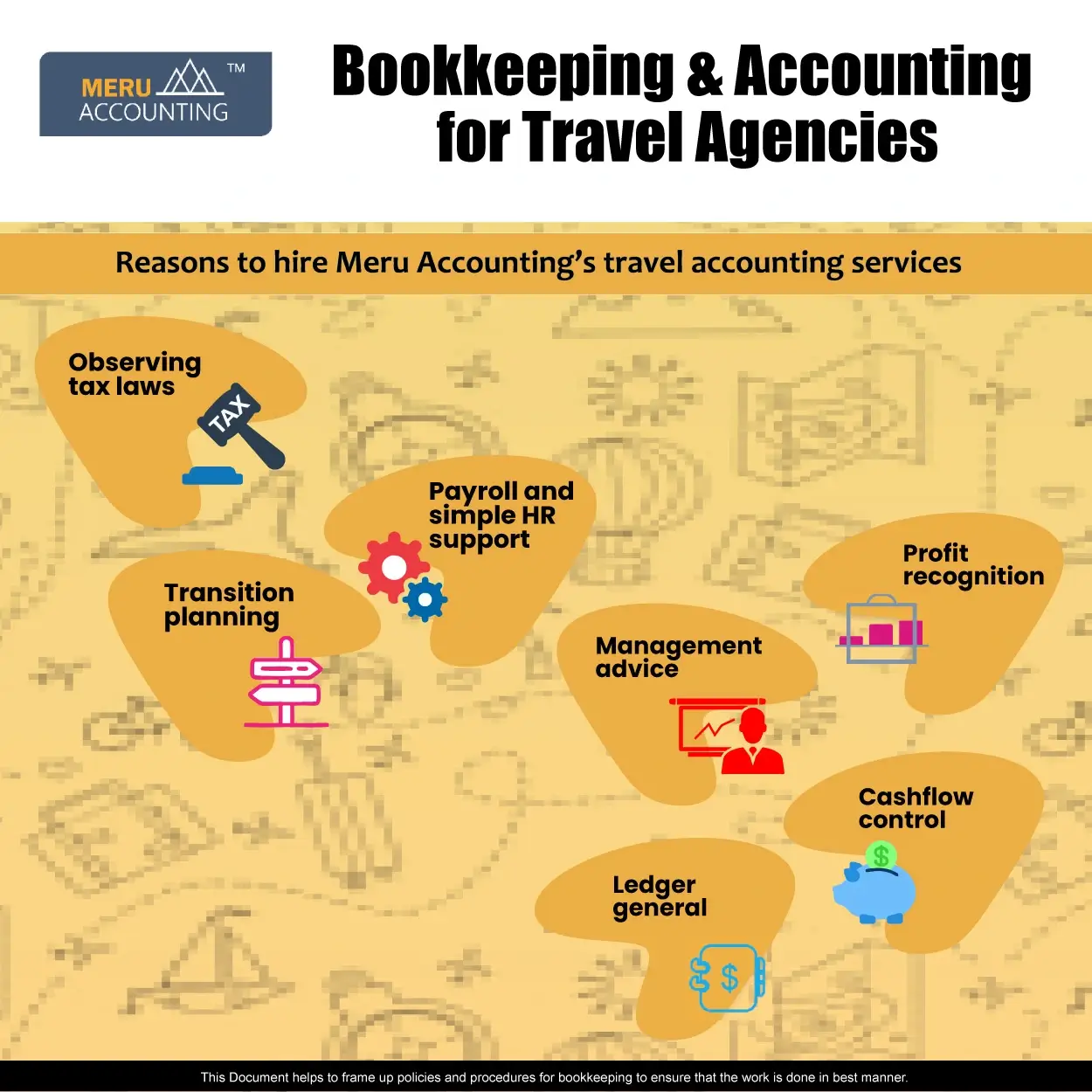
A more lucrative travel agency is based on timely and accurate financial reporting.
Independent agents, franchisees, and owners of tourist agencies benefit from our bookkeeping services for travel agencies so they may manage their operations with ease.
Travel-specific cashflow requirements, expenses, and revenue can all play a role in a travel agency's bookkeeping.
Years of experience have been accumulated by our staff in assisting small and midsize business owners in managing their finances successfully.
We will work with you to expand your company and overcome any obstacles you may encounter.
To accommodate our client’s needs and financial constraints, we design a unique service plan. Our primary goal is to increase your company's profitability.
Here are reasons why you need to think about experts that provide accounting for a travel agency.

Services Provided in Accounting for Travel Agency

As a cost-effective and practical alternative for the travel and tourist industry, we provide part-time and virtual CFO and controller services.
Observing Tax Laws
Adequate Bookkeeping for travel agency efficiently manages your tax filing for sales and use taxes as well as employer withholding taxes. Your payroll and sales tax filings can be handled quickly and efficiently by our qualified bookkeepers.
Payroll and Simple HR Support
You can save money by using our payroll and basic HR services instead of paying internal staff to process payroll and issue checks by hiring people to do bookkeeping for travel agency .
Transition Planning
To guarantee a seamless transfer, we support family-run travel and tourism firms and help them include a succession plan in their daily operations.

Profit Recognition
The most effective revenue recognition tactics are used by our experts. For this, we also employ the effective cash method.
Management Advice
The best management consulting services are offered by Adequate Bookkeeping, helping small business owners get the best results.
Cash Flow Control
A successful travel and tourism business must effectively manage its cash flow. We keep track of incoming costs, payments, and net cash flow from sales using the most recent accounting software.
Ledger General
Using the greatest accounting software, we update your general ledger on a regular basis. This general ledger is used to keep track of debts, assets, and the effects of daily and weekly transactions.

Our travel accounting services offer the precise and comprehensive financial data that travel agencies require to survive and function. You can hire us to handle your bookkeeping if you want the desired results.
Additionally, we assist you with more particular duties like producing profit and loss statements. Our experts are skilled in using any online accounting platform, including Xero, Zoho Books, and QuickBooks, with efficiency.
Why Choose Accounts Junction?
If cloud-based accounting is unfamiliar to you, we will also give you the support you need and outline the advantages of choosing it.
We have extensive knowledge in offering the best bookkeeping and accounting services to the travel and tourist sector. Our aggressive pricing strategy reduces the number of overhead expenses.
Benefits of Bookkeeping for Travel Agencies:
1. financial performance analysis:.
- Track income and expenses to analyze the financial performance of your travel agency.
- Identify trends, assess profitability, and make informed decisions for growth.
2. Effective Cash Flow Management:
- Maintain accurate records of incoming funds and outgoing payments.
- Monitor cash flow to ensure liquidity, timely payments, and positive supplier relationships.
3. Simplified Tax Compliance:
- Proper record-keeping throughout the year simplifies tax return preparation.
- Avoid errors, omissions, and penalties by having all necessary documentation readily available.
4. Facilitates Financing Options:
- Organized financial records enhance your credibility when seeking financing.
- Lenders require detailed financial information for loan approval, expansion, or investment.
5. Operational Efficiency:
- Bookkeeping streamlines administrative processes and improves overall efficiency.
- Save time and resources by having organized financial records readily accessible.
6. Budgeting and Forecasting:
- Accurate financial records help in setting budgets and making realistic forecasts.
- Plan for expenses, marketing campaigns, and future investments effectively.
7. Cost Control and Expense Reduction:
- Analyze expenses and identify areas where costs can be reduced.
- Optimize spending to increase profitability and operational efficiency.
8. Business Performance Evaluation:
- Use financial data to evaluate the success of marketing strategies and product offerings.
- Determine the profitability of specific services, destinations, or customer segments.
9. Compliance and Audit Preparedness:
- Proper bookkeeping ensures compliance with regulatory requirements.
- Minimize the risk of audits and penalties by maintaining accurate records.
10. Business Decision-Making:
- Make informed decisions based on real-time financial data.
- Evaluate the financial viability of new projects or ventures.
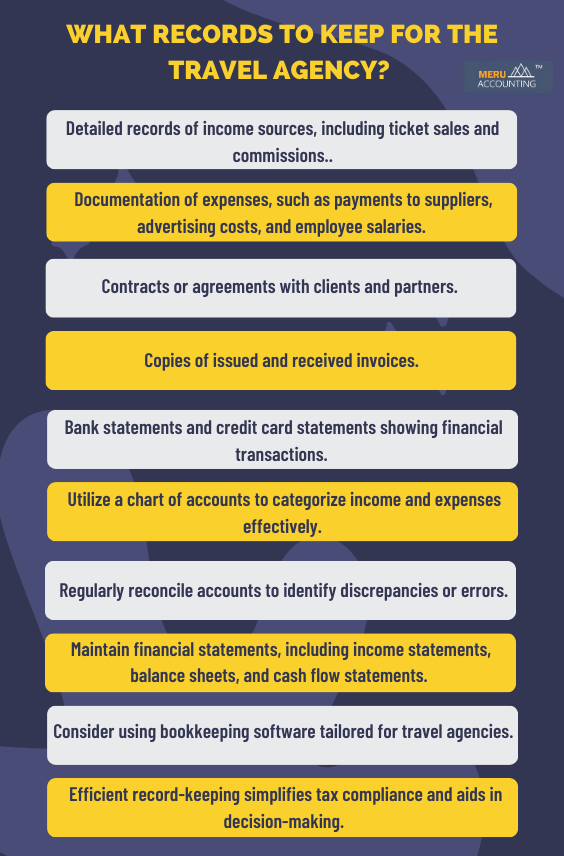
In conclusion, Accounts Junction stands as an indispensable ally for travel agencies, offering a comprehensive suite of bookkeeping services that streamline financial operations and enhance overall efficiency. Through our tailored solutions, precise record-keeping, and expert financial insights, travel agencies can focus on delivering exceptional travel experiences while leaving the complexities of financial management in capable hands. With Accounts Junction as a reliable partner, travel agencies can confidently navigate the dynamic landscape of the travel industry, secure in the knowledge that their financial affairs are managed with utmost professionalism and precision. By fostering a strong foundation of financial stability, Accounts Junction empowers travel agencies to thrive and grow, ensuring a seamless journey towards continued success.
How does Accounts Junction help in bookkeeping for travel agencies?
1. revenue tracking:.
Accounts Junction allows travel agencies to track different sources of revenue. Our firm establishes separate income from flight bookings, hotel reservations, tour packages, and other travel-related services. This helps in accurately recording and analyzing revenue streams.
2. Expense Allocation:
Accounts Junction assists in allocating expenses to specific categories within a travel agency. This can include costs related to accommodations, transportation, marketing, staff salaries, or office supplies. By properly categorizing expenses, it becomes easier to track spending, monitor budget adherence, and identify areas for cost control.

3. Cost of Goods Sold (COGS):
For travel agencies that provide tangible products such as travel packages or promotional items, Accounts Junction aids in calculating the cost of goods sold. By connecting expenses related to the production or procurement of these goods with revenue generated from their sales, COGS can be accurately determined for financial reporting and analysis.
4. Commission Tracking:
Travel agencies often earn commissions from airlines, hotels, and other service providers. Accounts Junction helps in tracking and recording these commissions separately, allowing for a clear view of income derived from commission-based arrangements. This assists in assessing the profitability of different partnerships and adjusting commission structures if necessary.
5. Financial Analysis:
Accounts Junction enables the generation of financial statements for travel agencies. By consolidating data from different accounts, including revenue, expenses, and assets, financial reports such as income statements, balance sheets, and cash flow statements can be prepared. These statements provide valuable insights into the financial health and performance of the travel agency.
6. Tax Compliance:
Accounts Junction aids in tax compliance for travel agencies. By categorizing transactions appropriately, travel agencies can accurately determine their taxable income, claim eligible deductions, and ensure compliance with tax regulations. This simplifies the tax filing process and minimizes the risk of errors or discrepancies.
Other Industries

ECOMMERCE BUSINESSES
Each day, the device of our screen is bombarded by advertisements of various products being sold by online selling

Being a trader is much more than just doing buy or sell transactions. It requires one to be focused on the core strategies

PROFESSIONALS
With changing time, human requirements are also changing rapidly and with that the professional services are picking upwards.

CPA Firms CPA firms are very popular now days with more and more businesses understanding

FILM PRODUCERS
Film production is a very versatile task in itself, and doing so requires immense amount of knowledge, hard work

INTERNET MARKETER
With the boom of digital media, internet marketing has also been started blooming at a great pace.

The education industry is one the most vibrant industries, as it spreads knowledge and educates children. Along with educating

Law firms have to handle numerous things at the same time, and that too with great level of understanding

REAL ESTATE RENTAL
Cash flow analysis is defined as analysing a business’s income inflows and outflows during a certain period

CONSTRUCTION
Consectetur adipisicing elit sed doid apor incididunt ut labore

Accounting for the Hospitality Industry
Balance sheet in the hospitalisation industry is a very important exercise. It is important to classify your assets into current assets and non-current assets

Bookkeeping for Not for Profit Organizations
We will take care of the day-to-day bookkeeping function of your non-profit organization by providing timely and affordable services

Bookkeeping Services for Doctors
Running a successful medical practice is an art where you not only need good medical expertise but also the skills of managing a modern profitable business

Get in Touch

Contact Form

Meru Accounting is a leading Accountant consultancy firm having the head office in Ahmedabad, Gujarat. The firm is successfully run by CA Rushabh Shah and CA Harnish Shah and has elevated its wings in the countries like Australia, Newzealand, UK, and the USA.
get free quote
Fill the following form to get quote.

- [email protected]
- +1 (888) 865-5255
- Rayvat.Accounting
- Bookkeeping for Travel Agency
Bookkeeping Services for Travel Agency
When you start a travel agency or travel agent, you need to keep accurate accounting & financial records for your business with a bookkeeping for Travel Agency. These records help you keep track of your travel agency's performance and are necessary for preparing your tax preparation & return. The most important bookkeeping procedures for a travel agency are the cash flow statement, Accounts Payables & Receivables, the general ledger, and the income statement.

Work on enhancing the traveling and tourism experience by improving every stage of the Travel Agency. Be target-oriented and focus on digital and comfort-savvy clients. For the Bookkeeping of your travel agency, We care about our customers like no other. With the help of QuickBooks Bookkeeping Services , you can manage all your business operations effectively and smoothly. Quickbooks for Travel Agency is the best solution for traveling and agency.
Accountancy Services for Travel Agents Included with:
- Sales Journal
- Cash Receipt
Account Receivable
Cash disbursement.
- IATA ledger
- General Ledger
- Profit and Loss Account
- Balance Sheet
Sale Journal
To maintain an up-to-date record of all credit sales, the traveling company prepares a sales journal.
Cash Receipt Journal
It is used to record all revenues received by the travel agency during the period. In other words, transactions concerning cash, credit cards, and cheques are recorded in this journal.
When a traveling agency purchases tourism products and services from the supplier on credit, the amount owed to producers/suppliers/sellers is referred to as an account Receivable.
Cash outflows are recorded in the cash disbursement journal. Cash flow means the operating expenses of the travel agency like rent, salaries, telephone expenses, administrative expenses, financial and legal expenses, selling and distribution expenses, payments, etc.
Outsourced accounting services for travel agencies:
Our virtual accounting services provide the complete financial information travel agents and agencies need to operate efficiently and thrive. You can outsource your accounting, bookkeeping, payroll, and tax preparation services to us completely, get help with specific tasks like profit and loss account formatting, or use our services temporarily. Accounting for travel agencies is the most important and needed for small to large-scale traveling agencies.
Travel agency Accounting & Bookkeeping in USA's largest Metro areas:
Our QuickBooks accounting services are available anywhere in the USA. New York County travel agency bookkeepers serving : Manhattan, Brooklyn, Queens, The Bronx, Staten Island, East Syracuse, Syracuse, Cortland, Ithaca, Fairmount, Oneida, Fulton, Auburn, Rome, Oswego, Utica, Geneva, Watertown, Endwell.
Los Angeles travel industry bookkeepers serving: Los Angeles, Santa Monica, Irvine, Beverly Hills, Lucerne Valley, Pasadena, Newport Beach, West Hollywood, Culver City, El Segundo, Venice, and Torrance.
Chicago County travel agent bookkeepers serving: Oak Park, Berwyn, Forest Park, River Forest, Lincolnwood, Lyons, Maywood, River Grove, Evergreen Park, Evanston, Norridge, Melrose Park, Elmwood Park, Summit.
Houston County travel agency bookkeepers serving : Aldine, Algoa, Alvin, Angleton, Bay City, Baytown, Channelview, and Clear Lake City.
Phoenix County travel industry bookkeepers serving: Glendale, Paradise Valley, Tempe, Scottsdale, Peoria, Mesa, Sun City, Avondale, Goodyear, Chandler, Gilbert, El Mirage, Surprise, Sun City West, and Fountain Hills.
Nevada Country travel industry bookkeepers serving: Carson City, Churchill, Clark, Douglas, Elko, Esmeralda, Eureka, Humboldt, Las Vegas, Lander, Lincoln, Lyon, Mineral, Pershing, Storey, Washoe.
The best accounting software for travel agencies of all sizes: QuickBooks
Travel agencies need accounting software to make sure their business runs better. Whether this is a travel agency owner, franchise or independent agent and broker in the CLIA (and IATA) QuickBooks™ will ensure your financials are running smoothly with specific types of revenue that need to be tracked correctly for all types that exist within these industries!
QuickBooks is a powerful tool for any business, but it’s especially great if you have employees. With QuickBooks' Self-Service Payroll and the ability to organize income into tax categories all at once filing your taxes is as simple and efficient as possible!
Our experts can assist your agency with:
- Choosing the best bookkeeping software for your agency
- Migrating to Quickbooks™
- Setting your Quickbooks up for the first time
- Cleaning up your books on your accounting software that is already in use
- Continuously updating your financials
Get travel Agency Bookkeeping Consultation:
Professional Accountants help in managing your books of accounts. Lets you focus on delivering best-in-class travel bookkeeping Services to your clients. We look forward to designing custom accounting solutions for the travel agency to help you make the most out of your business. MAC has years of experience working in accounting for travel agencies.
Contact us here for the Bookkeeping services for a Traveling agency.
Looking for Professional Approach and Quality Services ?
Bookkeeping For Travel Agencies: A Guide To Financial Clarity And Success 2023
Get Your First Month of Bookkeeping Services for FREE!
{{Quote.NameError}}
{{Quote.LastNameError}}
{{Quote.PhoneError}}
{{Quote.EmailError}}
{{Quote.LeadCommentsError}}
{{Quote.ValidationError}}
Travel agencies play a pivotal role in the multifaceted landscape of various sectors and industries, ranging from transportation and hospitality to meticulous planning. Seamlessly managing the intricate web of responsibilities demands precise attention, particularly when it comes to navigating the labyrinth of financial complexities that emerge from their presence in diverse locations. Efficiently orchestrating the financial intricacies of such businesses commences with a robust accounting system.
Effective bookkeeping not only ensures a streamlined operation but also serves as the bedrock for sustained business growth. As a travel agency proprietor, the dynamic nature of the industry, characterized by ever-evolving trends and client needs, likely resonates with you. In the relentless pursuit of progress, spending countless hours deciphering cash flows, tracking expenses, analyzing revenue, and other critical financial metrics is undoubtedly a daunting prospect.
However, such challenges should not hinder your focus on steering the ship of your enterprise and capitalizing on the vast potential for expansion. Recognizing the indispensable significance of sound financial management , our comprehensive guide seeks to demystify the intricate terrain of accounting and bookkeeping tailored explicitly for the unique demands of travel agencies. By delving into the fundamental nuances of this indispensable process, we endeavor to equip you with invaluable insights, empowering you to streamline your business operations and cultivate sustainable growth.
Bookkeeping: Your Business’s Ticket for Successful Financial Landing
Effective bookkeeping is a fundamental pillar in the financial architecture of any thriving enterprise. Within the realm of modern business, meticulously recording and organizing all financial transactions is an indispensable facet known as bookkeeping. Its significance is not confined to mere administrative tasks; rather, it serves as the bedrock for informed decision-making and sustained fiscal health. By diligently documenting the ebb and flow of funds, tracking revenues, payroll disbursements, tax payments, and other monetary movements, businesses can gain comprehensive insights into their financial landscape.
For all stakeholders, ranging from discerning investors to vigilant regulators, the efficacy of financial data management cannot be overstated. The meticulous maintenance of transparent and detailed records is the key to not just tracking a company’s financial standing, but also fostering an environment of trust and accountability. The transparency afforded by comprehensive bookkeeping instills confidence in the stakeholders, engendering a sense of trust in the financial stability and operational integrity of the company.
Beyond Operations
The quintessential role played by bookkeeping extends beyond the realm of operational logistics. It serves as the lighthouse guiding a company through the tumultuous waters of regulatory compliance. By maintaining meticulous records and adhering to standardized bookkeeping practices, companies ensure seamless compliance with the labyrinthine regulations stipulated by the Internal Revenue Service (IRS) and other financial governing bodies. The repercussions of non-compliance can be onerous, resulting in legal entanglements and reputational damage. Effective bookkeeping not only mitigates these risks but also fosters a culture of prudence and integrity within the organization.
In the dynamic landscape of modern business, bookkeeping transcends the boundaries of a mere administrative function. It assumes the role of a compass, guiding businesses through the tempestuous terrain of financial uncertainties. Through the systematic recording and organization of financial data, bookkeeping arms businesses with the tools necessary to navigate the intricate web of financial complexities.
Furthermore, the importance of bookkeeping is underscored by its pivotal role in enabling businesses to gauge their financial health accurately. By meticulously summarizing the inflows and outflows of resources, businesses can derive invaluable insights into their operational efficiencies and identify potential areas for optimization. Periodic analyses of the meticulously maintained books of accounts yield comprehensive reports such as balance sheets, income statements, and cash flow statements, empowering businesses to chart strategic pathways for growth and expansion. These reports not only provide a panoramic view of the financial landscape but also serve as the springboard for setting realistic and strategic business goals.
As businesses expand their horizons and venture into new markets, the role of bookkeeping assumes an even more significant dimension. It becomes the bridge connecting operational efficacy with financial prudence, facilitating informed decision-making and fostering sustainable growth. The adage that ‘knowledge is power’ holds particularly true in the context of business, and bookkeeping serves as the conduit through which this knowledge is distilled into actionable insights and strategic foresight.
Significance of Bookkeeping for Travel Agencies
In the dynamic world of business, irrespective of its industry, scale, location, or ownership, bookkeeping stands as a cornerstone of financial management . This fundamental practice plays a pivotal role in maintaining an organized and comprehensive record of financial transactions, and travel agencies are no exception to this rule. As a travel agency owner, embracing regular bookkeeping is imperative for several compelling reasons.
Organizing Crucial Financial Information
- The financial records of your travel agency are a mirror reflecting the true health of your organization. Whether you’re seeking loans, grants, or conducting basic business analysis, having your financial information meticulously organized is paramount.
- Without proper bookkeeping, your transaction data is scattered, making it nearly impossible to determine your capital, profits, and areas that require attention. Bookkeeping bridges these gaps by consolidating your financial information into an easily readable format.
Informing Business Decisions
- Successful business ownership entails being a constant decision-maker, often in a high-pressure, fast-paced environment. Effective bookkeeping , followed by accounting, empowers you to make well-informed decisions.
- In the realm of travel agencies, decisions can range from hiring more employees, expanding geographically, diversifying services, securing additional office space, exploring new marketing channels, providing raises to your employees, or offering enticing customer discounts. The list is endless, and a deep dive into your financial records facilitates these decisions, enabling you to gauge your business’s financial capacity at any given moment.
Filing Taxes Accurately
- When the word ‘taxes’ is mentioned, deductions often come to mind. Accurate tax filing hinges on meticulous financial records. Inaccurate bookkeeping can transform tax season into a stressful and perplexing ordeal.
- Organized bookkeeping means you possess detailed records of your travel agency’s receipts, invoices, and balance sheets. This, in turn, simplifies the process of tax filing and can also help identify potential tax exemptions, thereby potentially reducing your tax liability.
Performance Analysis and Budgeting
- Effective financial planning and budgeting are underpinned by a comprehensive understanding of your past performance. Well-organized, clear, and up-to-date records, facilitated by diligent bookkeeping, allow you to assess past performance and formulate future strategies accordingly.
- For your travel agency, meaningful performance metrics may encompass annual revenue, revenue growth in comparison to the previous year, ROI on various marketing expenditures, and fluctuations in service costs over time. Sound financial planning requires budgeting for expenses ranging from personnel to marketing, investments, growth initiatives, and everything in between, which necessitates accurate bookkeeping.
Attracting Investors
- Scaling your travel agency often requires external investments in the form of capital, equity, grants, or debt. However, potential investors demand a lucid understanding of your business’s financials before committing funds.
- In the absence of comprehensive accounting records, investors cannot gauge the potential success or pitfalls of your travel agency, rendering them hesitant to invest. Venture capitalists and angel investors typically insist on up-to-date books as a prerequisite for funding. Without meticulous bookkeeping, securing vital investments becomes an arduous endeavor.
Simplify Your Travel Agency Bookkeeping with Remote Books Online
In conclusion, proficient bookkeeping stands as a foundational cornerstone of sound financial management for travel agencies . It serves as the bedrock for maintaining meticulously organized financial records, facilitating well-informed decision-making, seamlessly navigating intricate tax obligations, conducting comprehensive performance evaluations, and fostering a conducive environment for essential investments.
As a discerning proprietor of a travel agency, the incorporation of regular and rigorous bookkeeping practices transcends being a mere preference; it represents an unequivocal necessity for steering your enterprise towards an upward trajectory of expansion, profitability, and long-term viability. Operating within the realm of a fast-paced and dynamic industry such as travel, managing the intricate accounts single-handedly can readily become an overwhelming endeavor, particularly when one is actively pursuing business growth and scaling initiatives.
Gone are the antiquated days of manual accounting practices, replete with cumbersome registers and ledger books. Contemporary cloud-based accounting and bookkeeping solutions have ushered in an era of operational ease, streamlining crucial business functions in unprecedented ways.
Enter Remote Books Online, a comprehensive and specialized answer to all your financial management imperatives . Our tailored cloud-based bookkeeping and accounting services are precisely calibrated to meet the specific demands of your travel agency enterprise, effectively alleviating the burdens associated with bookkeeping, tax compliance, expense tracking, payment management, and an array of other intricate financial tasks. We pledge to handle these intricacies with meticulous care and attention to detail.
Embrace the transformational potential of Remote Books Online and redirect your energies towards the cultivation of astute business decisions, secure in the knowledge that your financial department is in the most capable of hands.
Get Your First Month of Bookkeeping for FREE!
First month bookkeeping free, get a quote.
- Bookeeping services for $95/Month
- Monthly rates include accounting software subscription fee.
- Books done by Certified QBO advisors.

Call: +91 7384718607
Logging in will help you easily save and manage your your itineraries and bookings.
Dont have an Account? REGISTER here
Signing up will help you easily save and manage your itineraries and bookings
Already have an Account? LOGIN here
Forgot Password
Enter your email ID. We will email instructions on how to reset your password.

Maintaining accounting for travel agents
Share using:
http://www.tourgenie.com/travel-diaries/travel-blogs/maintaining-accounting-for-travel-agents
Accounting is a major factor in any kind of business. It is designed to communicate, record, and pass the correct information to the internal as well as external users and recognized as an information system. The classification, recording, and summarizing accounting information to determine the financial strength and weakness of an agency is done through accounting . It is no doubt an important area in a travel agency business.
A travel agency profitably demands all accurate information, recordings, and preparations of its financial statements. As mentioned earlier, accounting plays a vital role in determining the correct and fair status of the travel agency business and also helps in making strategic plans and decisions. If you run a business or are thinking of running a travel agency soon, you must be preparing for some kind of investment to make for your business. It is really important to keep a record of every penny you use for starting or running your business to calculate the amount you have spent and the profit you had from it. The basic objective of accounting is to get the information of the profit and finance position of your travel business. To achieve this objective you are required to prepare and keep journals and some statements as listed below.
Maintaining Sales Journal by Travel Agencies
Sometimes some travel agents in a travel operation extend credit facilities for its customers like leisure and commercial clients—all these credit sales of travel business are recorded in a sales journal. A travel agency also makes some cash loans to its clients at certain points, which are also recorded in the sales journal. However not every travel agency can afford to extend credit. It has been recorded that only large-scale travel businesses do so for their corporate customers although a thorough check for credit is required prior to opening of a credit amount. A sales journal is extremely important for a travel agency during accounting .
Accounting for travel agents
Accounting Record of Cash Receipt
Keeping a record of receipts is extremely important for travel agencies during accounting . One of the important categories of accounting is to record all revenues received by the travel agency during the period of running the business. The transactions concerning cash, cards like debit or credits, and cheques for tour packages, commissions received by travel business from hotels and airlines, and other sources like vendors are all recorded in an accounting journal.
Account Receivable in Accounting
Account receivable is the term referred to the amount owned to producers, sellers, or suppliers for the purchase done by a travel agency for tourism services and travel products on credit. It is one of the important data for accounting to be recorded in the travel business.
Keeping a Record of Cash Disbursement for Accounting
Also called a cost journal, in cash disbursement journal all cash outflows of travel business are recorded. It is important to keep track of all the operating expenses of a travel agency for ease in accounting . The salaries of employees of the travel business, rents, telephone expenses, financial and legal expenses and administrative cash outflow, selling and distribution expenses, etc should all be recorded in the cash disbursement section of a travel operation.
Cash and cards transactions
Travel Ledger—The Chief Book of Accounts in Accounting
The chief book of accounts is the destination point of entries in journals and sub journals used for balancing the accounts of travel agency business. Balancing the accounts in accounting means the continuous and consistent check and verifications of accuracy of the accounting system of a travel agency. There are certain objectives of travel ledger in accounting for a travel agency as listed below.
- The identification of the revenue sources of travel agency
- Determining total sales in both cash and credits
- Determining total commission earned by travel agency through various sources
- Determining and finding out the total amount owned to travel ledger
- Evaluation of performances of all travel agencies recognized by travel ledger
Almost all travel agencies use Electronic Data Processing System or EDP these days for maintaining their accounting data resulting in an up to date record of each cash and credit transactions. The procedure of posting travel ledger is also really simple and understandable. All you have to do is enter the date, items, invoice number prior to entering the gross amount of cash and card transaction. Then calculate the commission and feed the travel agency commission column with that value. Now you have to subtract the commission from gross and enter the result in net amount column if any due is remaining simply put it in the due column.
Payroll Journal of Travel Agency for Accounting
Here, all the records of salaries and other benefits relating to finance are maintained by a travel agency. All these records include the number of employees and their salaries, insurance premiums, compensations, the total budget for salaries, housing facilities, medical facilities, etc. In any travel business, all the records from every journal are complied monthly and posted in a general ledger.
Any travel agency business requires a good accounting system for cash flow, profit and loss statistics, financial statements, which are basically the reflection of financial position and operating strength or weakness of a travel business, the establishment of budgets, etc. Accounting also helps in relating the responsibilities of executives, and a continuous comparison of the position of the travel agency can also be made by providing the agency useful parameters in measuring travel business’s performance. The travel agency management will be able to tape correct information and timely actions through the accounting system. An accounting system in a travel agency helps to conduct its business efficiently and effectively as a whole.
Going the Digital Way
When it comes to data collating, calculation, and safety, online travel management software is the answer.
There are many such software in the market that you can check out and subscribe to. If you want to stay ahead of the competition, going digital and online is your best bet.
Also check:
How to start a travel agency
Itinerary software for travel agents
What is customer relationship management - all you need to know
No Comments
Your details are safe with us
Trending Blogs

General Read More

Leisure Read More

Adventure Rush Read More
Latest blogs.

History Read More

A call to all travel junkies
Share your amazing travel stories & inspire someone today, become a tourgenie contributor, write for our blog, want to explore more activities.

Trek to Goecha La

Ziro Music Festival

Lhuentshe Tshechu Festival Tour
- ABOUT TOURGENIE
- BLOG FOR US
- ENTRY & EXIT POINTS
- TERMS & CONDITIONS
- Arunachal Pradesh
- TRAVEL AGENT
Near Co-Operative, Middle Sichey Gangtok, East Sikkim, India, 737101
+91 7384718607
Bookkeeping and Accounting for Travel Agencys
Searching for a bookkeeper and accountant for your travel agency? We manage your books, giving you more time to plan unforgettable trips for your clients. Try us for free.
No credit card required. By clicking ‘Get Started’, I agree to Bench’s Terms & Privacy Policy .

How Bench works with travel agencys
Journey through your bookkeeping, income tax prep, and filing with confidence—guided by our team of experts, all running on one powerful platform. Bench caters to the unique needs of travel agencies.
We get you set up
Our team prioritizes comprehending the specifics of your travel agency, answering your questions, assisting you in connecting your accounts, and demonstrating how Bench integrates with your operations.
We do your bookkeeping
Every month, your dedicated bookkeeper sorts through your travel agency's transactions and compiles financial statements. If they require any additional information from you, they'll promptly reach out.
We deliver tax-ready financials
Our team of experts understands the tax regulations related to travel agencies and will tailor their approach to your agency's individual requirements.
Here’s why travel agencys like you trust Bench with their bookkeeping and accounting
Get fast, unlimited support from our expert advisors.
At Bench Accounting, we constantly provide bookkeeping updates tailored for travel agencies. Got urgent inquiries that just can't stall? We assure you a response in one business day or less.

Guaranteed accuracy in every detail
Our platform enables you to automate data entries from most major providers eliminating frequent errors. We collaborate with leading vendors like Gusto, Stripe, Shopify, and Square—ensuring your travel agency's finances are always precise and up-to-date.
See where you’re spending. Make smart decisions
Wave farewell to heaps of itinerary print-outs and tiresome manual booking tracking—we automate inputs straight from your linked accounts. Gain insights from one unified dashboard so you can effortlessly comprehend the health of your travel agency and make strategic decisions.

Bench integrates with your favorite small business tools
We sync seamlessly with your financial accounts and tools to keep your books up-to-date and save you the time and effort of manually uploading documents.

Trusted by 25,000+ American small business owners

CHRIS RONZIO

DR. BUKKY KOLAWOLE

HEATHER SHOLL
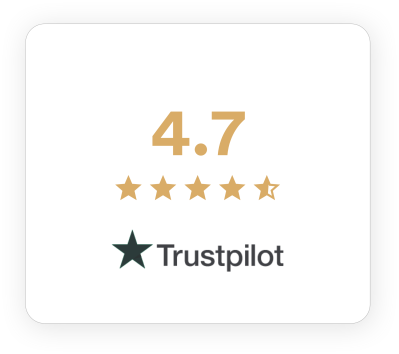
We know bookkeeping for travel agencys
In the ever-changing landscape of travel agencies, managing finances can often feel like navigating through uncharted territory. That's where Bench steps in. We understand the unique challenges that travel agencies face, such as fluctuating revenues, unpredictable expenses, and the global implications of tourism taxes. We help manage these complexities by providing online bookkeeping services, tailored to the specific needs of your travel business. Bench combines intuitive software with real, human bookkeepers to manage everything from day-to-day expenses to annual financial statements, ensuring a hassle-free experience. Our team of experts is not only well-versed with the common bookkeeping challenges in the travel industry, but also intimately understands the specific tax laws and regulations that are applicable. Whether it’s handling VAT on international bookings, managing commissions and fees, or staying in compliance with differing regional laws, Bench covers it all. We can also help identify tax-saving opportunities specific to the tourism sector, like tax credits for hiring employees or tax deductions for certain marketing expenses. With Bench, you can focus on creating beautiful journeys for your clients, while we take care of your bookkeeping and taxes.

Simple, straightforward pricing for everything your business needs.
Get bookkeeping, tax prep, advisory, and filing with Bench's powerful, easy-to-use platform.
Choose Plan
billed annually
billed monthly
Frequently Asked Questions
Accounting for travel agencies can be distinct from other industries owing to the unique nature of their operations and transactions. Here are some specifics:
- Contingent Revenue Recognition: Often, the services in the travel industry are deemed to be rendered when the travel actually takes place which means the revenues can only be recognized then. This could be months after the payment has been received.
- Third-party Transactions: Travel agencies routinely sell packages and services procured from third-party vendors. Hence, there can be complexities in terms of accounting for these transactions.
- Unearned Revenue: Since customers usually pay for travel in advance, travel agencies must handle unearned revenues that convert into earned revenues only once the services are provided.
- Multicurrency Transactions: Being a global industry, travel agencies have to deal with multicurrency transactions and the accounting complexities that come with them.
- Tax Jurisdictions: Travel agencies often operate across multiple tax jurisdictions and thus must account for different tax regulations.
These factors make accounting for travel agencies quite different from other industries.
Travel agencies face a unique set of bookkeeping challenges due to the nature of the industry. Significant considerations include fluctuating travel costs, changes in industry rates, and complex commission structures. To manage these, it's essential to have a robust and dynamic bookkeeping solution in place.
Fluctuating travel costs mean that revenues and expenses can dramatically vary from month to month. As a result, cash flow management becomes incredibly crucial. Proper recording and categorization of these costs ensure that financial reports accurately reflect the business' performance.
Likewise, ever-changing industry rates – from airline tickets to accommodation rates – require regular adjustments in pricing strategy and expense management. This highlights the need for real-time bookkeeping that can keep pace with these changes.
Travel agencies also often handle numerous commission-based transactions, which can complicate bookkeeping processes. Every booking may involve different commission rates, making it crucial to track and manage these properly for precise revenue and cost figures.
Given these considerations, there is a significant benefit for travel agencies to consider professional bookkeepers who specialize in their industry. With their expertise, you can confidently navigate the fluctuating travel industry landscape and focus on doing what you do best - providing excellent travel experiences to your clients.
Yes, at Bench Accounting we are well-equipped to handle international transactions associated with travel agency operations. We have a well-experienced team that specializes in the intricacies of international finance, ensuring seamless bookkeeping regardless of the number or complexity of your transactions.
Nope! All bookkeeping is completed in-house.
Your bookkeeper will be your main point of contact, but at times you might hear from another member of your team. This is usually when your bookkeeper goes on vacation, is sick, or otherwise unavailable.
We handle the bookkeeping for you but sometimes we’ll need your input, especially at year-end. On average, expect to spend 15 minutes each month answering questions for your bookkeeper, or uploading supporting docs.
Bookkeeping Services for Travel Agencys
Sign up for a Bench trial, and get one month free. If you decide to go with us, we’ll take bookkeeping off your plate—for good.
- Popular Courses
- Drafting of Appeal
- More classes
- GST Audit Course
- More Courses
- Start a discussion
- Unanswered
- Report Abuse
Accounting enrtries for travel agents
RITESH SONIGRA (4 Points)
Dear sir, please help me for following querries:
1) I am a non IATA Travel Agent and am buying Air tickets from other IATA and non IATA agents and consolidators and also do hotel bookings and packages from them. My main source of income is commissions received from them including a deduction of 18 % GST and TDS @ 10% on Commission.
My main query is how to pass Accounting entries for the same in case of Recpts
For Example: The bill consist of detail as under
eg. Ticket Amount Rs.50,000
Add: Service Fee: 100
Add: GST @ 18% - 18
Total : 50,118
And Same Example in Booking of Air Tickets from IATA Agents:
Ticket Amount: Rs. 50,000
Less: Commission of 5% on Basic Fare of 30,000 = Rs.1500
Add: 18% GST on Commission: Rs. 270
Add: TDS on Commission: Rs. 123
Total Amount Payable to IATA Agent:: Rs. 48893
From the above example of 50,000 my nett income is only 1207
Pls advise what entries should be pass in my Accounts.
2 Replies
Sumesh Kulakkad (Senior Accountant) (114 Points) --> Replied 19 March 2019
Online classes for CA CS CMA. Professional courses for GST, Tally, Others & Books
Padam Kumar (2 Points) --> Replied 20 July 2023
Can you please clarify how you calculated 48,353/- (IATA)?
Leave a reply
Your are not logged in . Please login to post replies Click here to Login / Register

Recent Topics
- OCI Income Tax liability
- Forget to table no 13 in GSTR1
- In RPU 5.1- Challan status enquiry does not have y
- Filing previous income tax returns
- Ion of scrutiny gst returns and audit provision ap
- How do UK nursing educators provide feedback on as
- Updated ITR late fees issue?
- Cash credit by capital account tax applicable
- FORM 9A AND FORM 10
- Preference share redemption payment
More recent discussions | Post
Related Threads
Popular discussion.
view more »

Trending Online Classes
Certification Course on Practical Filing of Income Tax Returns

5th Live Batch for Basic and Advanced MS Excel

Live Course on Drafting of appeal and reply of penalty notice, Rectification and stay of demand (with recording)

Subscribe to the latest topics :
Search forum:.

Whatsapp Groups
Login at caclubindia, caclubindia.
India's largest network for finance professionals

Alternatively, you can log in using:
- Travel Agents
- Inbound Tour Operators
- Outbound Tour Operators
- Airline Vacation Companies
- Success Stories
10 Best Accounting Software for Travel Agencies
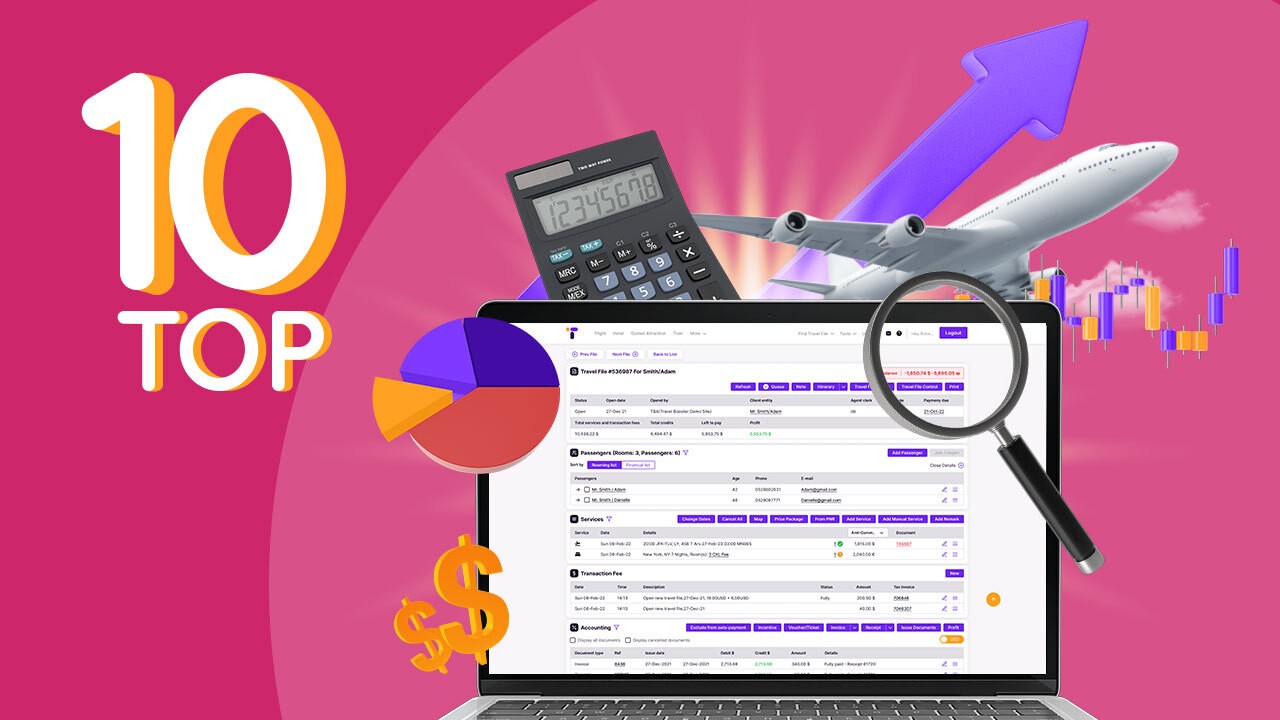
Do you ever feel like you’re drowning in a sea of financial data? Are you tired of spending countless hours tracking down transaction records, trying to reconcile accounts, and manually generating financial reports?
If you’re a travel agency, you know that managing finances can be an overwhelming task. But fear not, intrepid travel agency, because we’re here to help you navigate the choppy waters of accounting software.
Let’s face it, money is the lifeblood of any business, and travel agencies are no exception. Without proper financial management, your business could easily go off course. That’s why it’s essential to have top-of-the-line accounting software to keep your finances organized and running smoothly.
In this article, we’ve compiled a list of the best accounting software options for travel agencies to help you make an informed decision.
So, get ready to say “bon voyage” to financial stress! With the right software, you’ll be able to navigate the financial waters with ease, so you can focus on what you do best: creating unforgettable travel experiences for your clients.
The List of Best Accounting Software for Travel Agencies:
1. quickbooks online.
Some may argue that QuickBooks Online is the best accounting software for travel agencies. QuickBooks online is the equivalent of a Swiss Army Knife. It’s packed with features to help you manage your finances, from invoicing and payment processing to expense tracking and tax preparation. Plus, it’s cloud-based, so you can access your financial information from anywhere, at any time. With QuickBooks Online, you’ll have everything you need to keep your travel business running smoothly.
Xero is another cloud-based accounting software for travel agencies. It offers similar features to QuickBooks Online but with a more user-friendly interface. Xero also integrates with a wide range of other business applications, such as travel booking platforms and payment gateways, so you can streamline your entire financial process.
3. FreshBooks
FreshBooks is a great choice for travel agencies that want easy-to-use accounting software that’s packed with features. With FreshBooks, you can send professional invoices, track expenses, and accept payments – all from one platform. Plus, its mobile app makes it easy to manage your finances on the go, whether you’re at the airport or lounging on a beach somewhere.
Wave is a free accounting software that’s perfect for small travel agencies. It’s ideal if you’re just starting out and don’t want to invest a lot of money in accounting software. Despite being free, Wave still offers a range of features, including invoicing, payment processing, and expense tracking. Plus, it integrates with a range of other business applications, so you can customize your financial process to suit your needs.
5. Zoho Books
Zoho Books is a cloud-based accounting software that’s perfect for travel agencies looking for a comprehensive solution. It offers invoicing, expense tracking, and payment processing capabilities, along with a mobile app that lets you manage your finances on the go. Plus, it integrates with other popular business applications like Zoho CRM, so you can streamline your entire financial process.
6. Sage Business Cloud Accounting
Sage Business Cloud Accounting is a powerful accounting software designed for small to medium-sized businesses. It offers a range of features including invoicing, payment processing, and expense tracking, along with inventory management and project management capabilities. With Sage Business Cloud Accounting, you’ll have all the tools you need to manage your finances and grow your travel business.
7. NetSuite
NetSuite is a cloud-based accounting software that offers a range of features to help travel agencies manage their finances. It provides invoicing, payment processing, and expense tracking capabilities, along with robust reporting and analytics to help you gain valuable insights into your finances. With NetSuite, you’ll have a comprehensive solution that seamlessly integrates with your other business applications.
8. Zoho Invoice
Zoho Invoice is a user-friendly accounting software that offers a range of features to help travel agencies manage their finances. It provides invoicing, payment processing, and expense tracking capabilities, along with time tracking and project management features. Zoho Invoice is also an online accounting software for travel agencies, so you can create professional invoices and accept payments online, making it easy to get paid for your travel services.
9. MYOB Essentials
MYOB Essentials is a cloud-based accounting software that offers a range of features for small to medium-sized travel agencies. It provides invoicing, payment processing, and expense tracking capabilities, along with inventory management and payroll features. MYOB Essentials also integrates with other popular business applications, such as payment gateways and customer relationship management (CRM) software.
Choosing the Right Accounting Software for Your Travel Agency
Now that you know some of the best accounting software options for travel agencies, how do you choose the right one for your business? Here are some factors to consider:
Your budget: Some accounting software options, like Wave and Zoho Invoice, are free or low-cost, while others, like NetSuite, can be quite expensive.
Your business size: If you’re a small travel agency, you may not need all the features of a larger accounting software solution like NetSuite. Look for software that fits your business size and needs.
Your industry-specific needs: If you need features like commission tracking or trip costing, consider accounting software options like TravelWorks that are specifically designed for the travel industry.
Integration with other business applications: Look for accounting software that integrates with other applications you use, such as payment gateways or CRM software, to streamline your financial process.
The level of support and customer service is another important factor to consider. It’s crucial to have access to knowledgeable support staff who can help you troubleshoot any issues that may arise and answer any questions you have about using the software.
The ease of use and user interface of the accounting software you’re considering. The software should be intuitive and user-friendly, allowing you to navigate through the system and perform tasks with ease.
Your long-term goals for your travel agency . As your business grows and evolves, your accounting software needs may change as well. Look for software that can scale your business and offer advanced features as you need them.
Don’t Let Finances Hold You Down: Accounting Software Can Help You Soar!
Managing your travel agency’s finances can be a daunting task, but with the right accounting software, you can make it a breeze. From the free and easy-to-use options like Wave and Zoho Invoice to more comprehensive solutions like NetSuite and TravelWorks, there’s a software option to suit every travel agency’s needs.
It’s not just about choosing the right accounting software, it’s also about seamlessly integrating it with your other business applications. That’s why Travel Booster’s comprehensive ERP comes with endless integrations, making it seamless to integrate your accounting software. This results in an even more efficient financial process, freeing up your time to focus on other aspects of your business.
And we know that every travel agency has unique financial needs, which is why our software supports all types of accounting transaction methods, whether it’s domestic/outgoing, agents vs. sales and purchases, or anything in between.
Our unique TBAPI allows us to export all accounting data into a generic Excel format that can be easily transmitted onto any accounting software. This means that you have the freedom to choose the best accounting software for your travel agency’s needs, without worrying about compatibility issues. We believe that financial management should be stress-free and seamless, and our accounting software is designed to make that a reality.
So if you want to take your travel agency’s financial management to the next level, look no further than Travel Booster. Our comprehensive ERP enables endless integrations, providing you with the tools you need to succeed in today’s competitive travel industry.
Subscribe to our newsletter
Let's go for a journey
Schedule a meeting
More Resources
Reshaping travel as we know it: ai’s evolutionary impact on the industry, unveiling the future: 6 fintech trends revolutionizing the travel industry, enhancing travel industry success through advanced reporting and bi solution.
SMALL BUSINESS MONTH. 50% Off for 6 Months. BUY NOW & SAVE
50% Off for 6 Months Buy Now & Save
Wow clients with professional invoices that take seconds to create
Quick and easy online, recurring, and invoice-free payment options
Automated, to accurately track time and easily log billable hours
Reports and tools to track money in and out, so you know where you stand
Easily log expenses and receipts to ensure your books are always tax-time ready
Tax time and business health reports keep you informed and tax-time ready
Automatically track your mileage and never miss a mileage deduction again
Time-saving all-in-one bookkeeping that your business can count on
Track project status and collaborate with clients and team members
Organized and professional, helping you stand out and win new clients
Set clear expectations with clients and organize your plans for each project
Client management made easy, with client info all in one place
Pay your employees and keep accurate books with Payroll software integrations
- Team Management
FreshBooks integrates with over 100 partners to help you simplify your workflows
Send invoices, track time, manage payments, and more…from anywhere.
- Freelancers
- Self-Employed Professionals
- Businesses With Employees
- Businesses With Contractors
- Marketing & Agencies
- Construction & Trades
- IT & Technology
- Business & Prof. Services
- Accounting Partner Program
- Collaborative Accounting™
- Accountant Hub
- Reports Library
- FreshBooks vs QuickBooks
- FreshBooks vs HoneyBook
- FreshBooks vs Harvest
- FreshBooks vs Wave
- FreshBooks vs Xero
- Free Invoice Generator
- Invoice Templates
- Accounting Templates
- Business Name Generator
- Estimate Templates
- Help Center
- Business Loan Calculator
- Mark Up Calculator
Call Toll Free: 1.866.303.6061
1-888-674-3175
The Best Accounting Software for Travel Agency
The all-new Accounting Software from FreshBooks lets you manage your travel agency finances with ease so you have more time to focus on your clients.

Reviews Tell Our Story
Make billing painless with FreshBooks’ simple and intuitive cloud-based software that lets travel agencies send invoices and accept payments online quickly and easily.
Bookkeeping Software Built for Your Travel Agency Business
Discover bookkeeping software that’s ridiculously easy to use. FreshBooks makes it simple for travel agents to create professional invoices in a flash. Email them to clients and securely process credit card payments.
Your data is securely stored in the cloud so you can send invoices and do your bookkeeping anywhere, from any device. Add team members, too.
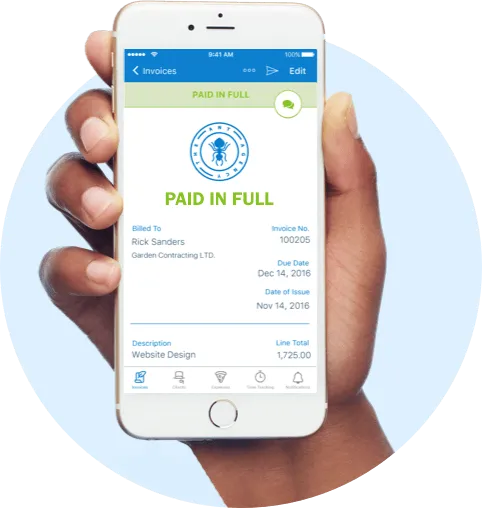
Travel agencies will also love FreshBooks’ simple expense tracking features. Simply connect your bank account and credit card and your expenses are imported and categorized automatically. Monitor your spending with our easy-to-understand dashboard and make tax time less of a headache.
Discover how easy it is to do your bookkeeping with software that’s designed for travel agencies , not accountants.
Store client data and create invoices in a flash. Plus, automate time-consuming tasks by turning on payment reminders, automatically importing expenses and setting up recurring billing.
Look Professional
Customize your invoices easily by adding payment terms, a logo or header and a personalized “thank you” message. Wow your clients with professional, crystal-clear invoices that show off your brand.
Get Paid Faster
Get paid 2x faster with invoicing software that lets you send invoices and accept payments online. Set it and forget it with recurring invoices or billing schedules that automatically charge client credit cards.
FreshBooks Accounting Software Testimonial Videos
Invoicing Software and Time and Expense Tracking for Travel Agencies
FreshBooks makes invoicing painless for travel agencies. Easy-to-use features let you request retainers, commissions or annual fees, add discounts, set up payment schedules and even automate late payment reminders and fees. It supports multiple currencies and languages, as well. See all of your paid and outstanding invoices at a glance to monitor income and know who owes you what.
Email invoices to customers for free and accept payments online. Or print them off and mail them to customers who love snail mail. Either way, FreshBooks has beautiful templates that will make your billing shine.
FreshBooks also makes time tracking a cinch. Use our timer to accurately record time spent per client, then create invoices from your time log. You’ll never be scrambling again to remember how many hours you worked for what client. Then add team members so you can see overall billable hours per client.
Monitor your business expenses, too. Connect your bank account and credit card and watch as your expenses are automatically imported and categorized. Stay on budget and know exactly how much you’re spending with easy-to-understand reports. It makes doing your taxes a snap, too.
Featured In
Accounting app for travel agencies that offers secure online payments.
Manage your travel agency’s accounting on the go with the FreshBooks app. Send professional invoices from the road and check the status of payments. Track your billable hours with the app’s timer and import them into your invoices. You can even get notified of client comments and feedback and respond to them directly via the app.
And since mobile updates are automatically synced with all your devices and desktops, you can work with the latest information even if you’re out of the office.
Expense tracking is also a snap with the FreshBooks app. Take photos of your receipts and add important details. FreshBooks will automatically add the expense to your account.
FreshBooks supports secure online credit card payments, too. Charge for a new booking and send invoices via the app to the client’s email. The client can then securely pay their bill with a couple of clicks. The FreshBooks app will notify you as soon as the invoice is paid.
- Choosing an Accounting Software for Your Tax Business
What Is the Best Accounting App for Travel Agencies?
Choosing an accounting software for your travel agency.
Travel agencies want an accounting solution that’s simple and intuitive. They prefer platforms that allow for multiple users, let them track billable hours and offers superior customer support.
The software should be affordable, too and keep pace with them as their company grows. And invoicing should accommodate the travel industry’s different fee models. And whether you’re charging for a tour or resort package, invoicing should always be easy.
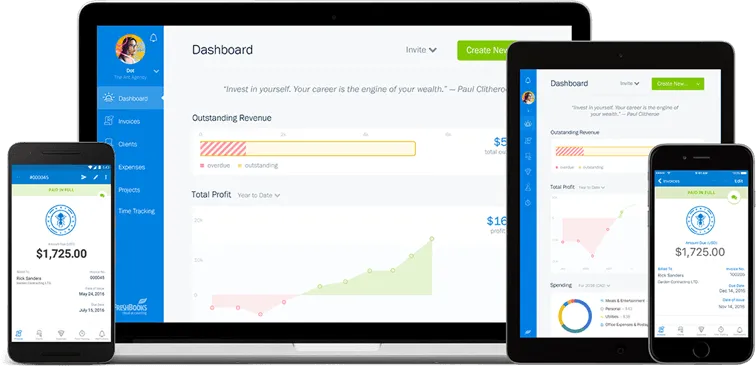
Take Your Travel Agency to the Next Level
FreshBooks is designed for small businesses like travel agencies. Its fun and friendly interface will have you sending professional invoices and estimates, managing expenses and accepting credit card payments quickly and easily. It offers unlimited award-winning email and phone support, too.
Its invoicing software is flexible, as well. Request commissions, retainers and annual fees, set up automatic billing schedules or import time logs by client.
Plus, FreshBooks integrates with over 70 apps in every category from customer support to sales to online payments.
Another bonus: FreshBooks is affordable.
Get a 30-day free trial and budget-friendly plans that start at $15 per month.
Award-winning customer support.
- Help From Start to Finish : Our Support team is highly knowledgable and never transfers you to another department.
- 4.8/5.0 Star Reviews : Yup, that’s our Support team approval rating across 120,000+ reviews
- Global Support : We’ve got over 100 Support staff working across North America and Europe

Advance Your Travel Business with Double-Entry Accounting on FreshBooks
While your clients are jet setting across the world, you’re doing everything you can to scale your business to new heights. Part of running a successful travel agency is staying on top of your business finances in order to know where your business is at and where it is going.
FreshBooks Integrates with All Your Favorite Apps
You can now customize your FreshBooks experience with a range of business-friendly apps. Take control of your business accounting with the help of these integrations.
See all Integrations

Benefits for Your Travel Agency
At FreshBooks, we’re obsessed with helping business owners like you stay on top of their business accounting and make informed decisions about their finances. That’s why our accounting software now includes double-entry accounting – an industry standard feature that ensures you have the most accurate data possible.
Now you have a complete picture of the financial status of your business and are able to know for certain that your books are up-to-date.
These new double-entry accounting features include:
- Cost of Goods Sold
- General Ledger
- Trial Balance
- Chart of Accounts
- Bank Reconciliation
- And Other Income
Want to expand your business? Add new travel packages? Reach new markets? With FreshBooks, you’ll know exactly where your business stands and whether you’re ready to take that next step in your business.
Try out our accounting software, now with double-entry features, today.
Manage your travel agency from anywhere with the FreshBooks accounting app.
With a simple, intuitive interface and automatic syncing to all devices, the FreshBooks app lets you keep your finger on the pulse of your business from the road.
All FreshBooks plans have access to the following powerful app features:
- Create and send professional invoices
- Snap photos of receipts
- Manage expenses
- Get notified of important updates
- Respond to client questions
- Data synced across all devices (mobile and desktop)
Try FreshBooks for FREE today!
WHY BUSINESS OWNERS LOVE FRESHBOOKS
SAVE UP TO 553 HOURS EACH YEAR BY USING FRESHBOOKS
SAVE UP TO $7000 IN BILLABLE HOURS EVERY YEAR
OVER 30 MILLION PEOPLE HAVE USED FRESHBOOKS WORLDWIDE
👋 Welcome to FreshBooks
To see our product designed specifically for your country, please visit the United States site.

Current time by city
For example, New York
Current time by country
For example, Japan
Time difference
For example, London
For example, Dubai
Coordinates
For example, Hong Kong
For example, Delhi
For example, Sydney
Geographic coordinates of Elektrostal, Moscow Oblast, Russia
City coordinates
Coordinates of Elektrostal in decimal degrees
Coordinates of elektrostal in degrees and decimal minutes, utm coordinates of elektrostal, geographic coordinate systems.
WGS 84 coordinate reference system is the latest revision of the World Geodetic System, which is used in mapping and navigation, including GPS satellite navigation system (the Global Positioning System).
Geographic coordinates (latitude and longitude) define a position on the Earth’s surface. Coordinates are angular units. The canonical form of latitude and longitude representation uses degrees (°), minutes (′), and seconds (″). GPS systems widely use coordinates in degrees and decimal minutes, or in decimal degrees.
Latitude varies from −90° to 90°. The latitude of the Equator is 0°; the latitude of the South Pole is −90°; the latitude of the North Pole is 90°. Positive latitude values correspond to the geographic locations north of the Equator (abbrev. N). Negative latitude values correspond to the geographic locations south of the Equator (abbrev. S).
Longitude is counted from the prime meridian ( IERS Reference Meridian for WGS 84) and varies from −180° to 180°. Positive longitude values correspond to the geographic locations east of the prime meridian (abbrev. E). Negative longitude values correspond to the geographic locations west of the prime meridian (abbrev. W).
UTM or Universal Transverse Mercator coordinate system divides the Earth’s surface into 60 longitudinal zones. The coordinates of a location within each zone are defined as a planar coordinate pair related to the intersection of the equator and the zone’s central meridian, and measured in meters.
Elevation above sea level is a measure of a geographic location’s height. We are using the global digital elevation model GTOPO30 .
Elektrostal , Moscow Oblast, Russia
Wind & weather forecast Elektrostal
- Superforecast
Daily forecast
Saturday, may 18, sunday, may 19, monday, may 20, tuesday, may 21, wednesday, may 22, thursday, may 23, friday, may 24, saturday, may 25, sunday, may 26, monday, may 27, nearby spots (within 25 km).
- Fryazevo 6km
- Noginsk 9km
- Imeni Vorovskogo 10km
- Rakhmanovo 11km
- Pavlovsky Posad 12km
- Obukhovo 13km
- Pavlovsky Posad 14km Weather station Live measurements
Look at our wind map to find more spots among our 160,000 spots.
Elektrostal popularity
Most popular spots in russia.
Have a look at the top kitesurfing, windsurfing, sailing, surfing or fishing spots in Russia
Additional information
Check the wind forecast for Elektrostal when you search for the best travel destinations for your kiteboarding, windsurfing or sailing vacations in Russia. Or use our wind forecast to find the wind speed today in Elektrostal or to have a look at the wind direction tomorrow at Elektrostal.
Severe Weather Warnings

IMAGES
VIDEO
COMMENTS
A travel accounting system follows a design that aims to record all items related to the business's balance sheet as well as its income statement. These items spread across the likes of the agency's assets, liabilities, incomes, revenues, gains, losses, expenses, as well as the capital invested. An automated travel accounting system is ...
The most important accounting procedures for a travel agency are the cash flow statement, the general ledger and the income statement. ... Net MBA: General Ledger Entries ; Writer Bio.
Learn how to record, classify and summarize accounting information for travel agencies. Find out the journals, statements, ledgers and systems used to determine the financial strength and weakness of a travel agency.
Accounting is the system of recording, organizing, and overseeing a business's economic transactions. In tourism, accounting and bookkeeping allow travel agencies to oversee various financial operations, including selling travel packages, booking hotels, and managing travel expenses. To illustrate the importance of accounting for travel ...
A Chart of Accounts (COA) is an organized list of all financial accounts used by a business to record and report its financial transactions. The COA serves as the foundation for the company's accounting system, enabling accurate tracking and reporting of financial activities. For travel agencies, a well-structured COA can provide insights into ...
Not to forget - the extensive amount of time tax filing can consume. On the other hand, organized bookkeeping means having detailed records of your travel agency receipts, invoices, and balance sheets. In that case, getting your accounts audited would probably need much lesser time. 4. Performance analysis and budgeting.
It enumerates the net effect of the various transactions on cash and takes into account the receipts and disbursements of cash. It also summarizes and causes of changes in the cash position of a travel agency between the different dates of balance sheets. Profitability ratios are a fair indication of sound management of a travel agency.
While the joy of planning trips and ensuring memorable experiences for clients is unmatched, managing the finances of a travel agency is equally critical. Just as a traveler relies on a map, a travel agency requires meticulous bookkeeping to steer its journey towards profitability and success. 1. Recognizing the Unique Financial Landscape.
A more lucrative travel agency is based on timely and accurate financial reporting. Independent agents, franchisees, and owners of tourist agencies benefit from our bookkeeping services for travel agencies so they may manage their operations with ease.. Travel-specific cashflow requirements, expenses, and revenue can all play a role in a travel agency's bookkeeping.
The most important bookkeeping procedures for a travel agency are the cash flow statement, Accounts Payables & Receivables, the general ledger, and the income statement. Work on enhancing the traveling and tourism experience by improving every stage of the Travel Agency. Be target-oriented and focus on digital and comfort-savvy clients.
Organized bookkeeping means you possess detailed records of your travel agency's receipts, invoices, and balance sheets. This, in turn, simplifies the process of tax filing and can also help identify potential tax exemptions, thereby potentially reducing your tax liability.
The accounting process for a travel agency involves several critical steps, such as bookkeeping, budgeting, and financial reporting. Proper bookkeeping includes recording all financial transactions, including payments received, expenses incurred, and advance payments made. Budgeting is the process of forecasting future expenses and revenue ...
The travel agency management will be able to tape correct information and timely actions through the accounting system. An accounting system in a travel agency helps to conduct its business efficiently and effectively as a whole. Going the Digital Way. When it comes to data collating, calculation, and safety, online travel management software ...
Best for those looking for peace of mind and accurate financials done by professional bookkeepers. $ 249/mo. billed annually. Dedicated bookkeeping experts. Accurate monthly books and year-end tax-ready financial packages. P&L, balance sheet and 1099 reporting. Unlimited communication with your bookkeeping team.
My main query is how to pass Accounting entries for the same in case of Recpts. For Example: The bill consist of detail as under. eg. Ticket Amount Rs.50,000. Add: Service Fee: 100. Add: GST @ 18% - 18. Total : 50,118. And Same Example in Booking of Air Tickets from IATA Agents: Ticket Amount: Rs. 50,000.
Course format. This e-learning course requires approximately 20 hours of study, to be completed within 6 months. After the enrollment validity expires, the users will not have access to the course content and will not be able to take the exam/assessment. The recommended level for this course is Entry-level and Intermediate.
1. QuickBooks Online. Some may argue that QuickBooks Online is the best accounting software for travel agencies. QuickBooks online is the equivalent of a Swiss Army Knife. It's packed with features to help you manage your finances, from invoicing and payment processing to expense tracking and tax preparation.
Choosing an Accounting Software for Your Travel Agency. Travel agencies want an accounting solution that's simple and intuitive. They prefer platforms that allow for multiple users, let them track billable hours and offers superior customer support. The software should be affordable, too and keep pace with them as their company grows. And ...
Travel Agency Accounting Software should recognize the unique requirements of travel agencies and offers tailored features to meet those needs. Integration Capabilities: Look for travel agency accounting software that seamlessly integrates with your selling platforms like Amadeus, Galileo, Sabre, Low-cost carriers, Non-Air Booking portal, etc.
Animals and Pets Anime Art Cars and Motor Vehicles Crafts and DIY Culture, Race, and Ethnicity Ethics and Philosophy Fashion Food and Drink History Hobbies Law Learning and Education Military Movies Music Place Podcasts and Streamers Politics Programming Reading, Writing, and Literature Religion and Spirituality Science Tabletop Games ...
Its a city in the Moscow region. As much effort they take in making nice flags, as low is the effort in naming places. The city was founded because they built factories there.
Geographic coordinates of Elektrostal, Moscow Oblast, Russia in WGS 84 coordinate system which is a standard in cartography, geodesy, and navigation, including Global Positioning System (GPS). Latitude of Elektrostal, longitude of Elektrostal, elevation above sea level of Elektrostal.
Check the wind forecast for Elektrostal when you search for the best travel destinations for your kiteboarding, windsurfing or sailing vacations in Russia. Or use our wind forecast to find the wind speed today in Elektrostal or to have a look at the wind direction tomorrow at Elektrostal. Severe Weather Warnings